What to do when there is a problem with the principal
by: The GreatSchools Editorial Team | Updated: April 24, 2024
Print article

What makes a great school? Strong leadership is a key factor. A 2021 research report commissioned by the Wallace Foundation that looked at data from more than 22,000 school principals in four states concluded that replacing a below-average principal with an above-average principal results, on average, in an extra 2.9 months of math learning and 2.7 months of reading learning.
In our article What makes a great principal? you can learn about the four characteristics that great principals have in common and read real stories from principals on the job.
But what if your school has a bad principal? How do you know if your principal is providing the kind of leadership that it takes to make a great school? Knowledge of these warning signs will help you to identify if there is a problem and, if necessary, how to take action.

7 warning signs of a bad principal
If you notice any of the following signs, you may want to contact your superintendent:
1. The principal has no overall vision for the school.
The school principal doesn’t have a sense of what kind of school community he and the staff are trying to establish or what values the whole school should uphold. In their book, Qualities of Effective Principals , authors James H. Stronge and XIanXuan XU, the number one quality is “facilitating the development, communication, implementation, and evaluation of a shared vision of learning that reflects excellence.”
2. There is no plan to address academic achievement and the schools’ test scores continue to decline.
Although principals can’t take all the blame for declining test scores, they should have clear goals for school-wide academic improvement that they communicate to staff and students, and ways to measure improvement against the goals. They should include staff and parents in the goal-setting process.
3. The principal spends a lot of time in their office pushing papers.
The principal delegates discipline decisions and dealing with parents to the school secretary. You never see the principal in classrooms or on the playground. The principal doesn’t know students’ names and doesn’t interact with them.
4. The principal is seldom there.
The principal spends much of his time away from the school in meetings or at conferences.
5. The principal does not return your phone calls or emails.
If you have tried to contact the principal several times and he does not respond, you should be concerned. If you do make contact, but he doesn’t provide you with any possible solution, you have a problem.
6. The principal tells everyone what they want to hear.
The principal says “yes” to everyone but doesn’t take action.
7. The principal shows favoritism.
It is obvious that certain teachers, students, or parents have the ear of the principal but others do not. A 2020 study titled “ What are the practices of unethical leaders? Exploring how teachers experience the “dark side” of administrative leadership ” lists “displays of favoritism” as one of the six categories of irresponsible leadership.
When a parent should contact the principal
When you have a concern about your child’s academic achievement or discipline within the classroom, you should first contact your child’s teacher. If you are not satisfied with the teacher’s response, you should contact the principal. It is always better to try to work out problems with the teacher first. If you have a concern about a school-wide discipline problem or the school’s philosophy, you should contact the principal.
When a parent should contact the superintendent
If the principal does not return your phone calls or if you are dissatisfied with the response of the principal, then you should contact the superintendent. If you have concerns about the principal’s leadership abilities and you can clearly document those concerns, you should contact the superintendent. If several parents feel the same way, make an appointment as a group to visit the superintendent. There is always greater power in numbers!
Remember: the principal has a boss. The superintendent is in charge of hiring and firing principals. Likewise, superintendents are hired and fired by the school district’s Board of Education. If you have complaints that aren’t being addressed, deliver those concerns to people higher up the chain of command.

Homes Nearby
Homes for rent and sale near schools

Why your neighborhood school closes for good – and what to do when it does

5 things for Black families to consider when choosing a school

6 surprising things insiders look for when assessing a high school
Surprising things about high school
Yes! Sign me up for updates relevant to my child's grade.
Please enter a valid email address
Thank you for signing up!
Server Issue: Please try again later. Sorry for the inconvenience
- PRO Courses Guides New Tech Help Pro Expert Videos About wikiHow Pro Upgrade Sign In
- EDIT Edit this Article
- EXPLORE Tech Help Pro About Us Random Article Quizzes Request a New Article Community Dashboard This Or That Game Popular Categories Arts and Entertainment Artwork Books Movies Computers and Electronics Computers Phone Skills Technology Hacks Health Men's Health Mental Health Women's Health Relationships Dating Love Relationship Issues Hobbies and Crafts Crafts Drawing Games Education & Communication Communication Skills Personal Development Studying Personal Care and Style Fashion Hair Care Personal Hygiene Youth Personal Care School Stuff Dating All Categories Arts and Entertainment Finance and Business Home and Garden Relationship Quizzes Cars & Other Vehicles Food and Entertaining Personal Care and Style Sports and Fitness Computers and Electronics Health Pets and Animals Travel Education & Communication Hobbies and Crafts Philosophy and Religion Work World Family Life Holidays and Traditions Relationships Youth
- Browse Articles
- Learn Something New
- Quizzes Hot
- This Or That Game
- Train Your Brain
- Explore More
- Support wikiHow
- About wikiHow
- Log in / Sign up
- School Stuff
- Dealing with Teachers
How to Write a Complaint Letter to Your Principal
Last Updated: March 7, 2023
This article was co-authored by Tami Claytor . Tami Claytor is an Etiquette Coach, Image Consultant, and the Owner of Always Appropriate Image and Etiquette Consulting in New York, New York. With over 20 years of experience, Tami specializes in teaching etiquette classes to individuals, students, companies, and community organizations. Tami has spent decades studying cultures through her extensive travels across five continents and has created cultural diversity workshops to promote social justice and cross-cultural awareness. She holds a BA in Economics with a concentration in International Relations from Clark University. Tami studied at the Ophelia DeVore School of Charm and the Fashion Institute of Technology, where she earned her Image Consultant Certification. This article has been viewed 641,125 times.
As a young person, it takes a lot of courage to write a letter to your principal. It also requires careful planning and writing several drafts. It may seem like an intimidating task when you first begin working on your letter, but the result can be the end of a difficult problem.
Example Complaint Letter to Principal

Considering the Problem

- Before deciding to write a letter to your principal, ask yourself a few questions. Is this issue important enough to ask my principal about? Is there someone else who could help me with this problem? Can my principal do anything to help solve my problem?
- Other people who might be able to help you solve a problem include your parents, your teacher, the school secretary, and the school guidance counselor. If you can’t decide who would be the best person to ask, try making an appointment with your guidance counselor and ask their advice.

Writing Your Response

- You can write something simple like, "My name is Sam Jones. I’m in the 8th grade, and I am upset about the short lunch period."

- For example, if you are writing to tell your principal that your lunch period is too short for you to finish your meal, your desired outcome might be that they extend the lunch period by 5 minutes to allow more time for eating. Or maybe you could suggest that they allow additional bathroom breaks in the morning before lunch so that you don’t have to use your lunch time for a restroom break.

- Feel free to sign off your letter with a closer like "Regards" or "Thank you."
Revising Your Letter

- If you submit a handwritten letter, make certain it is legible. This may mean re-writing the letter once you have made all the corrections you want to make. Use your best handwriting for this letter. [2] X Research source

- This is also important because people are usually more willing to help you if you ask them nicely instead of being rude or demanding.
- End your letter with "Thank you for your time " or "Thank you for your consideration" to keep things polite.

- You should also date the letter on the day you turn it over to your principal.

- Asking an adult to read your letter is a good idea because they will probably be able to help you correct any written mistakes you made and to look at more complex issues in your letter like the tone and the logical sequencing of your thoughts.
- Asking another student to read your letter would be good too because they can help you decide if your request is reasonable within the context of your school’s rules and regulations. They will have a good working knowledge of the situation since it is their school too. But they might not be as good at catching grammatical mistakes as an adult would be.
Following Up

- Make sure the letter is sealed inside the envelope before you leave.

- If you haven’t heard back from the principal in a week after you deliver your letter, set up an appointment with your principal to discuss the issue in person. [4] X Research source

Community Q&A
- Use language that is professional (no slang) and will make adults take you seriously. Write in complete sentences and use spell check. Thanks Helpful 4 Not Helpful 0
- Take a friend with you if you need support to meet with your principal or the letter's recipient. Thanks Helpful 4 Not Helpful 1
- Generally, try to keep the letter to one page. If longer, number the pages. Thanks Helpful 3 Not Helpful 1
Tips from our Readers
- If your school is small enough, you can also talk to the principal in person. Just go to their office during your free time and ask if they have time to talk to you about the issue.
- If you are being bullied along with someone else, get them to add information about their experience to your letter and sign it too.
- Don't use any offensive or bad words in the letter. You won't be taken seriously and could get in trouble!

- Do not use offensive language. Thanks Helpful 142 Not Helpful 27
- Do not exaggerate or make up facts to make your case. Your credibility is important. Thanks Helpful 122 Not Helpful 23
- Do not get too personal about the teacher or whatever the issue is in your complaint. Thanks Helpful 120 Not Helpful 29
- Be formal, don't use slang, and don't swear (This is especially important if you know the principal is religious; for example, if s/he is Christian, don't say "hell" or "bloody"). Thanks Helpful 10 Not Helpful 1
Things You'll Need
- Notebook paper
- An envelope
- A computer (optional)
You Might Also Like

- ↑ http://www.factmonster.com/ipka/A0002121.html
- ↑ http://www.sample-resignation-letters.com/writing-a-complaint-letter-to-your-principal-with-sample.html
- ↑ http://www.educationalleaders.govt.nz/Managing-your-school/Guides-for-managing-your-school/Dealing-with-complaints
About This Article

To write a complaint letter to your principal, start by introducing yourself, and stating the reason for why you’re writing. For example, try something like, “My name is Jane Smith. I’m in the 8th grade and I am upset about the short lunch period.” Then, support your complaint by explaining how the problem affects you or people you know. Make sure to use polite and mature language since you’re addressing your principal. Additionally, check over your letter for spelling and grammar errors to ensure that your letter will be taken seriously. For more advice, including how to follow up after delivering your letter, keep reading. Did this summary help you? Yes No
- Send fan mail to authors
Reader Success Stories
Isaac Boakye
Jan 10, 2022
Did this article help you?

Lola Johnson
Aug 20, 2016

Featured Articles

Trending Articles

Watch Articles

- Terms of Use
- Privacy Policy
- Do Not Sell or Share My Info
- Not Selling Info
wikiHow Tech Help Pro:
Develop the tech skills you need for work and life
How to write a school report
Imagine the end of the academic year is upon us, and amidst the anticipation of summer, there’s a significant task at hand for teachers: the crafting of school reports. Far more than mere paperwork, these reports are a bridge between school and home, offering insights into a student’s progress, achievements, and areas for growth. They can influence a student’s self-esteem, motivate them towards future accomplishments, and foster a stronger partnership with parents—all pivotal components of a student’s academic journey.
Writing a school report, therefore, is much more than summarizing a year’s worth of grades and comments. It’s about capturing the essence of a student’s learning journey, highlighting their successes, and gently guiding them towards their next steps in education. In some ways, it’s an art form in itself, requiring a delicate balance between honesty and encouragement, precision and brevity.
This guide is designed to walk you through the nuances of creating effective and meaningful school reports. Whether you’re a seasoned educator or new to the teaching profession, the following insights will help you navigate the complexities of report writing, making it a less daunting and more rewarding part of your teaching role. Let’s embark on this journey together, transforming the task of report writing from a cumbersome obligation into an opportunity to inspire and engage with the young minds entrusted to our care.
What to report on
Navigating the vast landscape of a student’s academic year can feel overwhelming when it comes time to distill everything into a concise school report. However, focusing on key areas can not only streamline the process but also ensure that the report is informative, balanced, and tailored to the individual student. Here are the essential components to consider when determining what to include in your school reports:
1. Academic Achievements
Detail the student’s accomplishments across subjects, highlighting specific projects or assignments where they excelled. Aim to include examples that showcase their skills, understanding, and progress. This not only provides evidence of their achievements but also helps in painting a comprehensive picture of their academic journey.
2. Learning and Personal Development
Beyond academic performance, consider aspects of the student’s personal growth . This might include improvements in problem-solving, critical thinking, creativity, or resilience. Reflecting on how a student has developed personally and socially throughout the year offers a more holistic view of their progress.
3. Challenges and Areas for Improvement
Identify areas where the student faced challenges or could benefit from further development. Framing these within the context of their overall growth journey encourages a positive outlook towards overcoming these hurdles.
4. Behavior and Participation
Comment on the student’s behavior in class, their participation in discussions, group work , and extracurricular activities. This gives insight into their social skills , teamwork capabilities, and engagement with the school community.
5. Goals and Future Directions
Outline objectives for the student’s future learning, suggesting areas where they can aim to improve or subjects they might wish to explore more deeply. Setting goals helps motivate students and provides a clear direction for their continued education.
Tips for Effective Reporting:
- Use Positive Language: Frame challenges as opportunities for growth, using language that encourages and motivates.
- Be Specific and Evidence-Based: General comments are less impactful than specific examples that highlight a student’s achievements or areas for improvement.
- Personalize Your Comments: Tailor your reports to reflect the individuality of each student, making them feel seen and understood.
By focusing on these components, your school reports can become powerful tools for communication and motivation. They not only inform parents and guardians about their child’s progress but also play a crucial role in shaping the student’s self-perception and approach to learning.
Creating Focused and Concise School Reports
The art of writing effective school reports lies in the ability to convey meaningful information in a clear and succinct manner. With the limited space and the importance of maintaining the reader’s attention, focusing your reports ensures that they are impactful and valuable. Here’s how you can achieve this:
Keep It Relevant
Focus on the individual.
Every student is unique, with their own strengths, challenges, and journey through the academic year. Tailor your reports to reflect these individual differences, ensuring that your comments are directly relevant to the student in question. Avoid generic statements that could apply to anyone; instead, provide specific insights into the student’s personal academic and developmental journey.
Prioritize Key Points
Identify the most significant achievements, challenges, and areas for improvement for each student. While it might be tempting to cover everything, prioritizing the most impactful information will make your report more readable and meaningful. Ask yourself, “What are the key takeaways for this student’s year?”
Be Brief, But Comprehensive
Concise language.
Use clear, concise language to express your thoughts. Avoid jargon and overly complex sentences that might confuse readers. Remember, the goal is to communicate effectively with parents and students, not to impress with vocabulary.
Bullet Points and Highlights
When appropriate, use bullet points to break down information into digestible pieces. Highlighting major achievements or areas for growth can make your report easier to read and more accessible for parents and students alike.
Gather and Organize Your Information
Systematic note-taking.
Maintain organized records of student progress , achievements, and notable incidents throughout the year. This practice will save you time when writing reports and ensure that you don’t overlook important details.
Collaborate for a Holistic View
Consult with colleagues who have also taught or interacted with the student. This collaboration can provide a more rounded view of the student’s abilities and behaviors, enabling you to write a more comprehensive report.
Writing Tips for Clarity and Impact
- Start Strong: Begin each section of your report with the most important information to ensure key points are communicated effectively.
- Use Active Voice: Active voice makes your writing clearer and more direct, which is particularly effective in short reports.
- Examples and Evidence: Where possible, back up your statements with examples or brief anecdotes that illustrate the student’s progress or areas for improvement.
By adhering to these principles, you’ll be able to write school reports that are not only focused and concise but also deeply informative and engaging. This approach not only respects the time and attention of the report’s readers but also provides students and parents with clear, actionable insights into the student’s academic journey and personal growth.
Balancing Encouragement and Constructive Feedback in School Reports
Crafting a school report that both acknowledges accomplishments and addresses areas for improvement requires a thoughtful approach. Here’s how to strike that balance, ensuring your reports are not only informative but also inspiring and motivational.
Writing Encouragingly
Celebrate Achievements: Highlight the student’s successes, no matter how small. This recognition boosts confidence and reinforces positive behaviors and efforts. Use phrases like “demonstrated strong ability in” or “showed remarkable improvement in” to spotlight achievements.
Focus on Effort and Progress: Emphasize the student’s effort, resilience, and progress over the year. This approach shifts the focus from innate ability to growth and improvement, which is especially encouraging for students facing challenges.
Use Positive Language: Frame feedback in a positive light. For instance, instead of saying “failed to meet expectations,” you might say “has room to grow in.” This positive framing helps maintain a student’s motivation and self-esteem.
Personalize Praise: Make your commendations as specific as possible to the individual. This not only makes the praise more meaningful but also shows the student that you see and appreciate their unique efforts and achievements.
Delivering Negative Feedback
Be Specific and Objective: When addressing areas for improvement, be clear about the specific behaviors or outcomes that need attention. Use objective terms and avoid personal criticism to keep the feedback constructive .
Offer Solutions and Support: Alongside pointing out areas for growth, provide suggestions for how the student can improve. Offer resources, strategies, or additional support where possible. This shows your commitment to their development and turns challenges into opportunities for learning.
Balance with Positives: Use the “sandwich” method by framing negative feedback between positive comments. This technique helps soften the impact of criticisms and keeps the overall tone of the report encouraging.
Encourage a Growth Mindset: Remind students that abilities and intelligence can be developed with effort, strategies, and help from others. Encourage them to view challenges as opportunities to learn and grow, rather than insurmountable obstacles.
Practical Examples:
- Instead of: “John struggles with math and is below grade level.”
- Try: “John has shown a keen interest in understanding math concepts and, with continued support and practice, will develop stronger skills in this area.”
- Instead of: “Sarah lacks participation in class discussions.”
- Try: “Sarah has valuable insights to share and could enhance her learning experience by participating more in class discussions. Encouraging her to express her thoughts will boost her confidence and contribute to our classroom community.”
By applying these strategies, you can craft school reports that not only provide a realistic overview of the student’s performance but also inspire and motivate them towards future successes. Such reports can strengthen the student-teacher relationship, build trust with parents, and most importantly, empower students to embrace challenges and celebrate their progress.
Conclusion: Mastering the Craft of School Report Writing in Secondary Education
The process of school report writing, especially in the context of secondary education , embodies more than just an administrative or assessment task; it’s an art form that bridges the gap between a student’s efforts and their achievements. Despite being time-consuming, the creation of year reports is a fundamental exercise in providing detailed information about a student’s progress, both for the educators who compile them and the families who receive them.
The Value of School Reports in Secondary Schools
In many schools, the annual ritual of writing reports is a critical reflection of a student’s journey through complex secondary school subjects and personal development. These reports offer a unique opportunity to convey the outcome of various assessment tasks and the student’s own work over the year in a cohesive narrative that highlights growth, challenges, and future directions.
Navigating the Challenges
Acknowledging that school report writing can be a time-consuming endeavor is crucial. The meticulous nature of compiling detailed information for each student requires a significant investment of time and effort. However, this investment is what makes these reports invaluable. They are not just a record of achievements but a tool for feedback and forward planning.
Inspiring Future Endeavors
The ultimate goal of writing reports in secondary education is not merely to assess past performance but to inspire students for future learning. These documents play a pivotal role in motivating students, guiding them to recognize their strengths and areas for improvement. By providing a balanced view that celebrates achievements while also identifying challenges, educators can encourage students to engage deeply with their own work and learning journey.
Strengthening Educational Partnerships
Effective school report writing fosters a stronger connection among teachers, students, and parents. By sharing detailed information about a student’s progress, educators open the door for meaningful conversations about how to support the student’s education. These reports become a cornerstone for building trust and collaboration within the school community.
Embracing the Process
While the task of writing year reports for many schools may seem daunting due to its detailed and time-consuming nature, embracing this responsibility with a positive mindset can transform it into a rewarding aspect of teaching. Every report is an opportunity to reflect on the impact of your teaching and to contribute significantly to a student’s educational journey in secondary school .
Closing Reflection
As we refine our approach to school report writing, let us view each report as a canvas on which the story of a student’s year is painted. Let your reports be detailed, insightful, and inspiring, serving not just as an assessment tool but as a beacon guiding students toward their future successes. In the intricate tapestry of secondary education, your reports are threads that connect the past, present, and future, weaving together the rich narrative of each student’s academic and personal growth.
About The Author
Impact Teachers

Impact Teachers – An Introduction
Impact Teachers is a teacher recruitment company founded with a vision of making a local, national and global impact on education.
Read More »

Rob Grillo’s BEN Experience
Rob Grillo - Twelve months ago was nervously making his final plans before departure to India for his first trip with Impact Teachers to Bihar.

Impact’s Survival Guide: 10 Things NQTs Need to Know
There are countless myths about the big bad world of education and we at Impact are here to hook you up with fantastic teaching jobs…
2 thoughts on “How to write a school report”
THANK YOU FOR YOUR SOURCE. I GET MUCH INFORMATION FROM THIS.
You’re welcome. I’m happy we can support you. That’s what we like to do.
Leave a Comment Cancel Reply
Your email address will not be published. Required fields are marked *
Save my name, email, and website in this browser for the next time I comment.

School Report
Report generator.
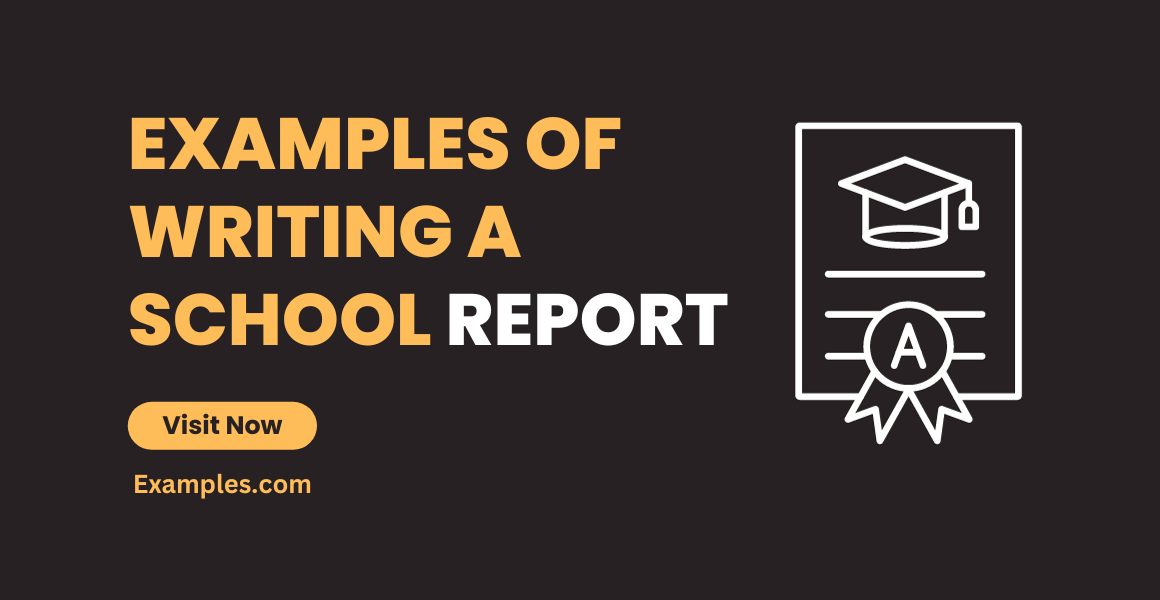
It’s practically a guarantee that you’ll encounter reports at various points of your life. These documents are everywhere, ranging from school to work or even more personal areas. When it comes to a school report, you’ll need to familiarize yourself with a lot of things. School report writing is one of those things. There’s also the school report meaning and many others. If you’re wondering where you can learn about these bits and pieces of trivia, then you’ve come to the right place. Scroll on to discover more, including an excellent school report example or school report template straight from our list of free downloads.
School Report Templates
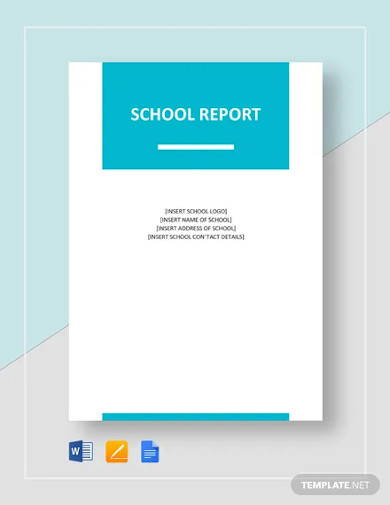
- Google Docs
Size: A4, US
Pre School Report Card Template
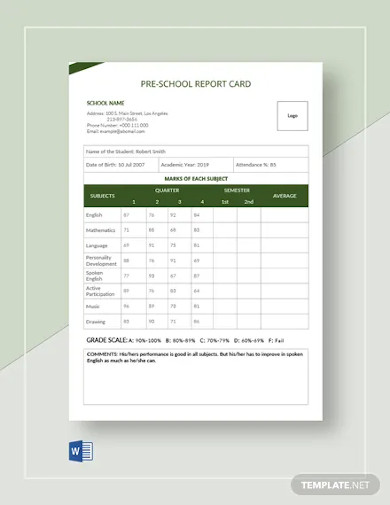
School Incident Report Template
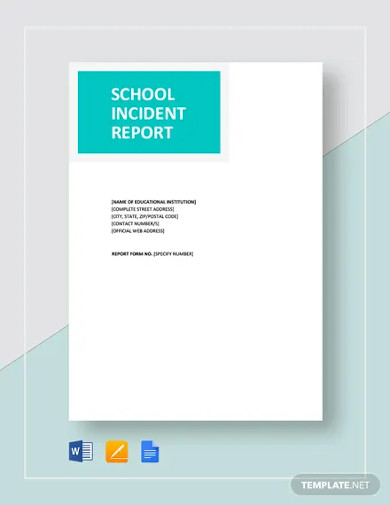
Home school Report Card Template
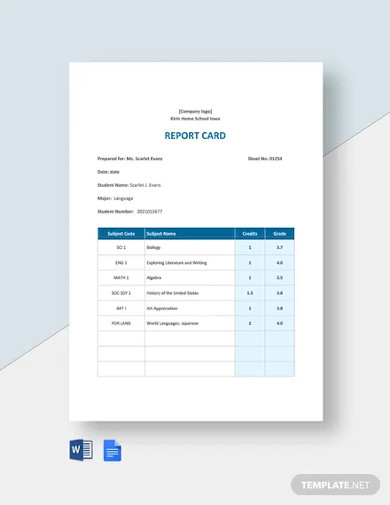
Primary School Report Template
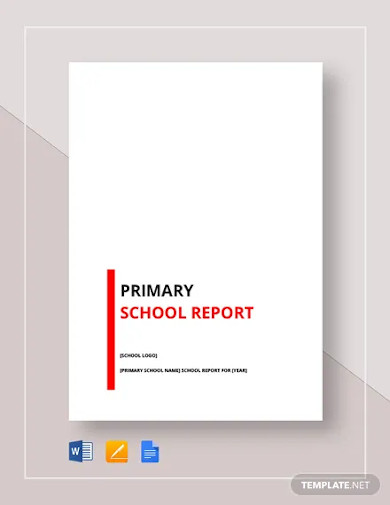
School Progress Report Template
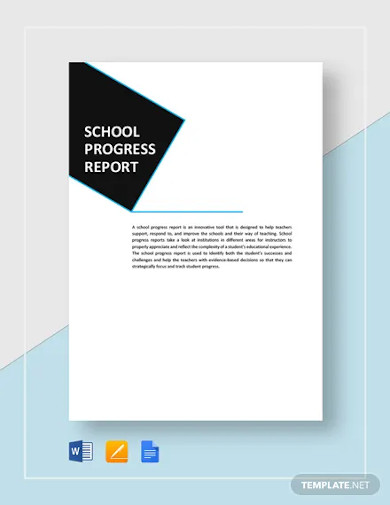
End of Year School Report Template
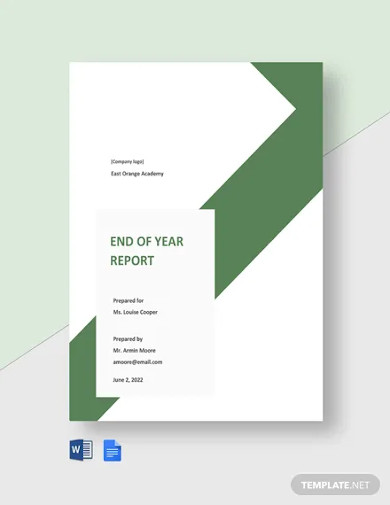
School Project Report Template
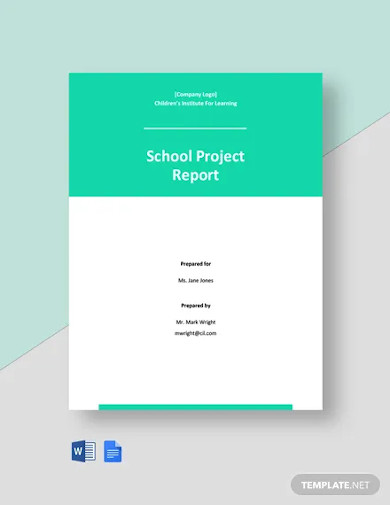
Simple Home School Report Card Template
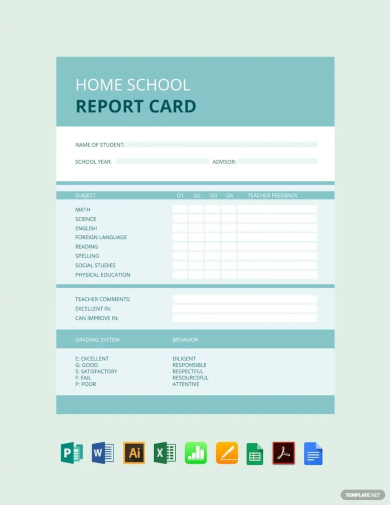
- Illustrator
- Apple Numbers
- Apple Pages
- MS Publisher
Size: 78 KB
Simple High School Report Card Template
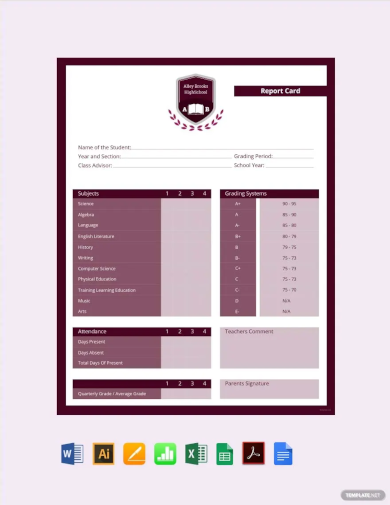
Size: 32 KB
Middle School Report Card Template
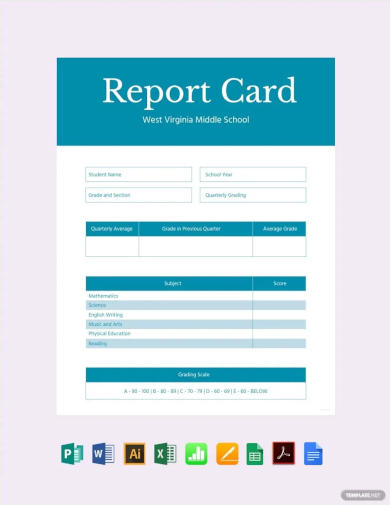
Size: 75 KB
School Report Card Template
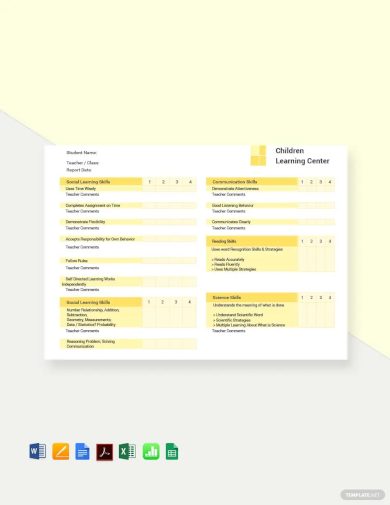
Elementary School Report Card Template
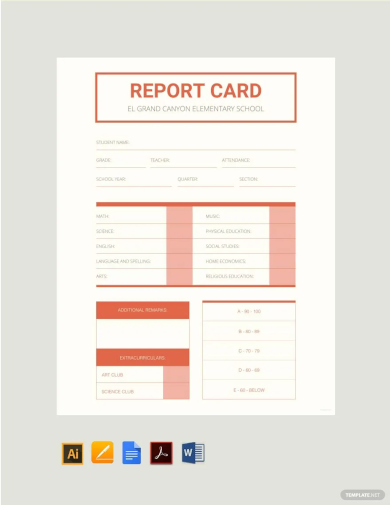
Size: 62 KB
Free Blank Preschool Report Card Template
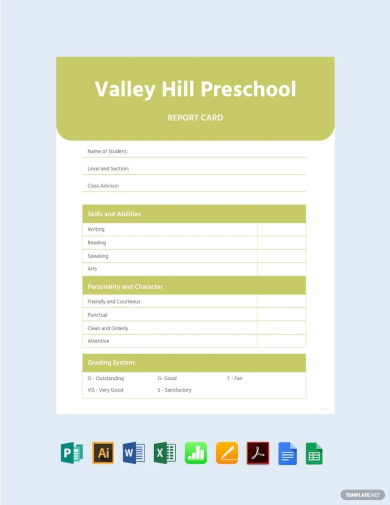
Size: 60 KB
High School Report Card Template
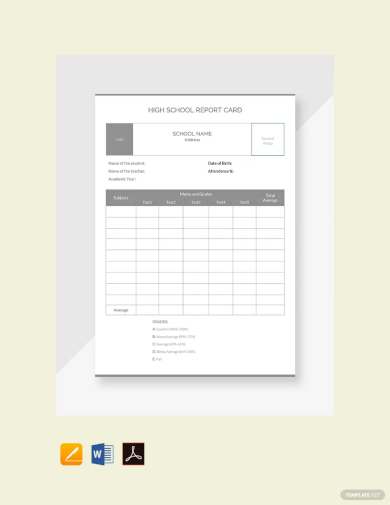
Size: 29 KB
Free Simple School Report Template
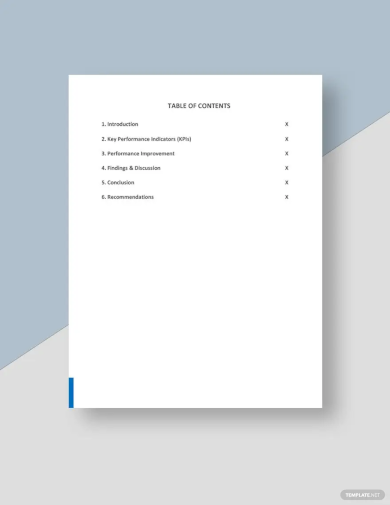
Size: 22 KB
Free Sample School Report Template
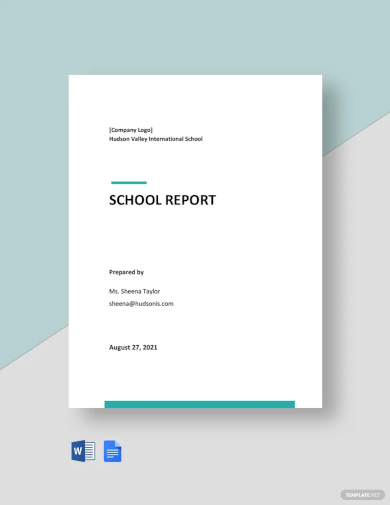
Size: 27 KB
School Progress Report Card Template
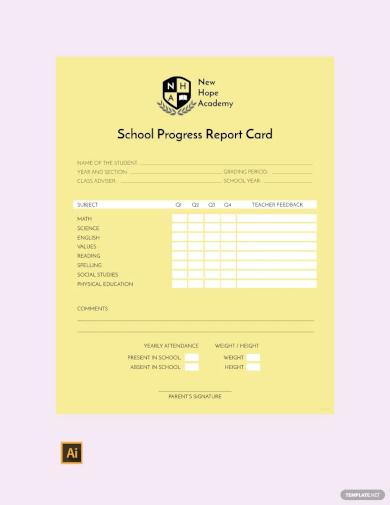
Size: 55 KB
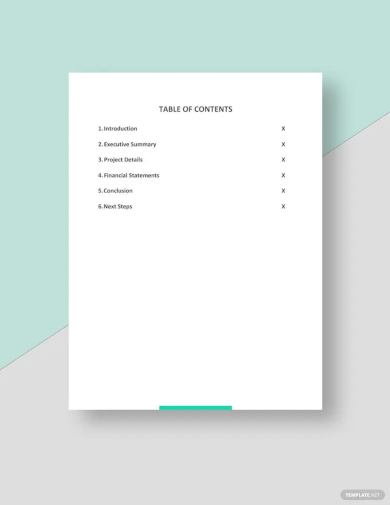
Size: 23 KB
School Feasibility Report Template
Size: 80 KB
Free School Board Report Template
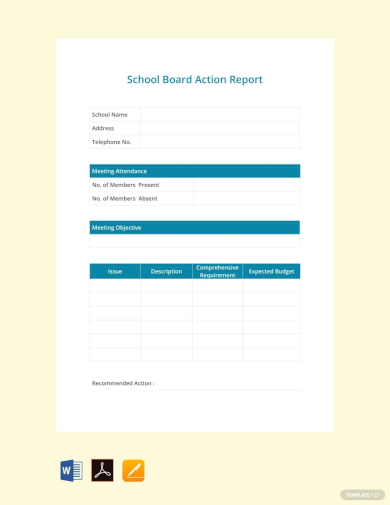
Size: 36 KB
Free School Annual Report Template
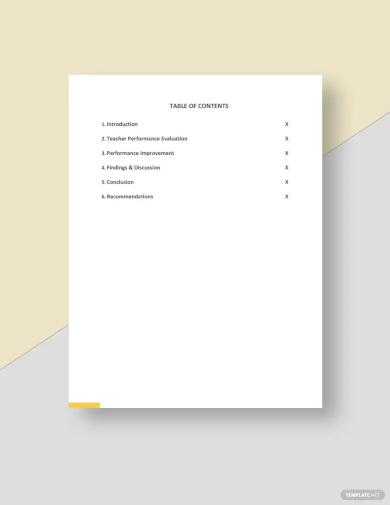
Free School Visit Report Template
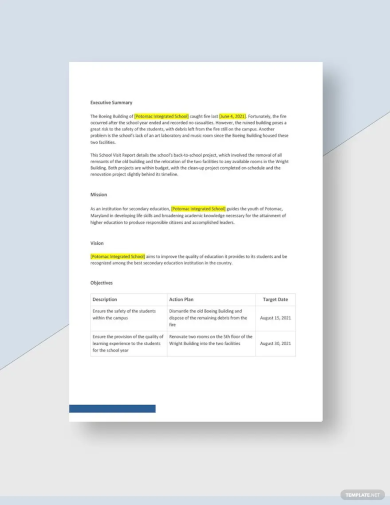
Free School Incident Report Form Template
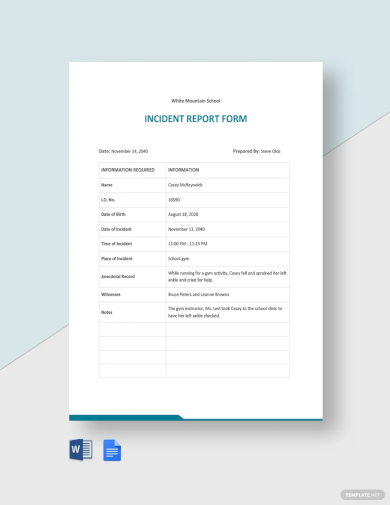
Size: 38 KB
What Is a School Report?
Such a loaded question will have different answers depending on who you ask. For some, this is what people mean when they talk about college applications school report. Others may have student record reports in mind when they think of school reports. If you are going by one of its definitions, a school report can be the recommendation written by a school counselor. It is often used to help evaluate prospects to determine whether they are worth admitting to the school or not.
Tips for Writing School Reports
Writing a school report should not prove to be too much to handle, but one can always use a boost whenever possible. To help with your report writing , here are four tips that you can keep in mind as you go through the endeavor.
Tip 1: Be Direct
There’s no use sugar-coating whatever it is you are trying to communicate. If you’re an administrator with duties to fulfill, it’s best to stick to the point not only to save time but also to make yourself easier to understand. For students writing reports in PDF , few things will help your writing than greater readability.
Tip 2: Supply Evidence
When you claim something in your report, you must provide the necessary evidence to support that claim. This is not only true for school reports of all kinds, but also for reports like research reports . Without evidence, your statements won’t have as much credibility—if it will have any at all.
Tip 3: Utilize Checklists
You may have a lot of ground to cover with your report. With everything on your plate, it wouldn’t hurt to have something like a scholastic checklist to help you keep track of everything. School reports, after all, must be easy to understand and highly organized.
Tip 4: Involve All the Necessary People
If you are a teacher and you need to write a report about a student, be sure to involve the student in the making of the report. This does not mean that he or she has to be with you as you write it. Rather, be open to communication early on. Set proper student goals to evaluate at the end of a specific time period. This way, they can help you by providing the right content for your report.
What are the common elements of a report?
Each report may, at any given time, contain the following elements: a description of a sequence of events, an interpretation of the significance of said events, evaluation, recommendations , and conclusions.
Is a school report a transcript?
It can be if the report centers around items like an individual student’s grades or performance. However, some reports are not necessarily transcripts. Examples of that would include assignment reports that are submitted in class.
How necessary are school reports?
School reports are often sent out to parents to inform them of their children’s academic performance . Such reports often come in the form of report cards. So with that said, it is absolutely necessary for school reports to be written and handed out.
School reports, as you now know, come in various forms. From the documents you create and submit to teachers to transcripts like a school report card , there’s just no escaping them. Having read our article from start to finish, you should now be better acquainted with school reports. Now all you have to do is make a choice regarding how you will apply this newly-gained knowledge. Will you keep browsing through our list of school report templates or will you make your own? Well, regardless of what you decide, be assured that you’re in an excellent position to make a well-informed choice. So choose wisely and act as soon as you can!
Text prompt
- Instructive
- Professional
Generate a report on the impact of technology in the classroom on student learning outcomes
Prepare a report analyzing the trends in student participation in sports and arts programs over the last five years at your school.
Teach Starter, part of Tes Teach Starter, part of Tes
Search everything in all resources
15 Helpful Tips for Writing Student Reports

Written by Victoria (Teach Starter)
Writing student reports is always a stressful time of year for teachers. To a new teacher, the task can become quite overwhelming. Where do I start? What do I write? How can I individualise my reports?
The main aim of a report is to inform parents and students of a student’s achievements at the time of reporting. It provides information on the progress the student has made since the last reporting period and outlines suggested steps that can be taken to ensure improvements are made.
To assist with your next reporting period, we have outlined ten helpful tips from teachers in the know about writing student reports.
Teacher Tips for Writing Student Reports
(1) know your school.
Your school, like every school, will have its own system for report card comments. Make sure to consult with your principal or curriculum coordinator to get a clear understanding of their expectations. If you’re a first-year teacher and are feeling totally overwhelmed, take the initiative to set up a meeting with a mentor or more experienced member of staff and seek guidance. Prepare your questions and take notes.
(2) Start early
Do you find it hard to get started with report card writing? Getting started can often be the hardest bit. It’s easy to feel overwhelmed by the enormity of the task and the thought of how long it’s going to take to finish report card comments for an entire class. Why not get a head start on your general comments as soon as you have gathered enough observational information from your students.
Tips for getting started on report cards…
- Set a timer for fifteen minutes and commit to writing two or three report card comments. Tell yourself you’ve only got to do it for 15 minutes.
- Break the huge task of report writing into smaller chunks. Consider starting with your general comments. Break your general report card comments into chunks of two or three a day.
- Start with the hardest task. You’ll be surprised how empowering and motivating it is to know that you’ve completed the bit you were dreading most. It’s all downhill from here!
- Use positive self-talk. Tell yourself I’ve got this, I can do this, I’m on a roll, and kid yourself – this is easy!
- Throw a report card writing party. Invite some of your nearest and dearest colleagues to come together and motivate each other to make a start!
(3) Ease of understanding
When writing reports to parents, it is important that you make each comment easy to understand. Try to use two connected ideas per sentence to explain how the student is progressing.
For example: ‘ When problem-solving, S arah needs to explain her mathematical thinking’ (first idea) ‘rather than recording the answers’ (second idea) .
(4) Report card comment bank
Comment banks are a useful go-to when you are struggling to express yourself in a clear and concise way. There’s no denying that they are a time saver. Opinion on whether report card comment banks are a good thing is split. In some schools the use of comment banks is compulsory, in others, they are frowned upon and in others, comment banks are optional.
During my teaching experience, I found a happy medium and used a combination of general comment bank statements with my own personalised comments.
If you need some help and support, download our Report Card Comments .

(5) Consider peer marking through the term
Marking is probably one of the biggest time saturators. During report card writing time, be strategic about the tasks you set to reduce your marking workload. One way to alleviate this pressure is to consider peer marking and self-marking. This is probably more suited to older students. Not only does this alleviate the pressure of you, but students also gain a lot from marking their peer’s work. Here are just some of the reasons we love peer marking:
- Exposure to a wide range of ideas and perspectives.
- Motivation to improve their own work.
- A deeper understanding of quality and the importance of meeting the success criteria.
- The opportunity to work in collaboration with others.
- The opportunity to develop self-assessment skills.
Provide your students with a peer marking scaffold by using our Two Stars and a Wish Poster and Feedback Slips or choosing from our selection of Checklist Resources .

(6) Stick to the point
When report writing, it can be very easy to divert from the point and include unnecessary information. Parents only need to be informed about important matters that are relevant to their child. Unnecessary information will only cause confusion.
For example, instead of ‘ John delightfully expresses a range of different ideas during whole-class discussions in our inquiry sessions’ , write ‘ John participates in class discussions and shares his ideas with others’.
(7) Avoid teacher jargon
Most parents don’t know ‘teacher talk’. Avoid using teacher jargon and specialist terms when writing reports. Present information in a clear and precise manner which makes it easy for parents to understand.
For example, instead of ‘Grace applies a range of higher-order thinking skills and comprehension strategies when decoding texts’, write ‘When reading, Grace uses a range of skills to identify the meaning of the text’.
(8) Inform parents about their child’s level of achievement
When report writing, try to avoid detailed curriculum descriptions or lists of all the units and activities you have covered in class. Parents want to know how their child is performing in relation to the expected levels of achievement, as well as the areas in which their child needs to improve.
For example, instead of ‘Daniel has developed efficient mental and written strategies and uses appropriate digital technologies for multiplication and division where there is no remainder’ , write ‘Daniel uses his knowledge of multiplication facts to solve a range of division problems. He is now working towards solving problems with larger numbers.’
It’s also a good idea to notify parents if their child is potentially dropping a grade from the previous report card. There’s nothing worse than a parent receiving a report card and not knowing their child may have dropped a grade and not understanding why.
(9) Refer to the child’s ongoing performance
When reading their child’s report, parents want to know what was learned, how well their child performed, whether there are any areas for improvement and what should be done for their child to meet the next achievement standard. Try and avoid any comments that may only refer to task completion or that only provide an evaluation.
For example, instead of ‘Emily has completed the required writing task’ , write ‘Emily has achieved a personal writing goal by constructing an informative text without the use of a scaffold. She is now working towards punctuating her writing correctly’.
(10) Use evidence to support your comments
When writing reports, continuously refer back to samples of students’ work. Use these work samples as evidence to indicate individual student achievements against the standards, or in comparison to other students in the class. Base your comments on quality evidence and be prepared to provide parents with examples of their child’s work.
Evidence also includes data collected by the teacher; such as anecdotal notes, tracking sheets and a record of scores. Ensure you have evidence for areas of strength and improvement, ways in which the school has or will support the child and how parents can assist their child at home.
(11) Consider the collection of data
Collecting data throughout the school year is greatly important for report writing. It enables you to track the progression of each student and their learning, as well as provide you with a collection of quality evidence.
Don’t leave your collection of data and report writing to the last minute. This will not only create stress for you, but for your students (who will certainly not appreciate being given a year’s worth of assessment tasks in one week!) Keep a scrapbook to take notes as you walk around the classroom, use samples of work from daily activities, or take photos during group tasks. The more you collect, the more evidence you will have and the easier it will be to write your reports.
For more ideas on how to get organised for the collection of data for report cards, check out our blog – The Ultimate Time-Saving Tip for Report Cards .

(12) Use a checklist
Prevent the chance of leaving something out or writing too much by using a report writing checklist . A checklist will ensure that you have included student achievements, areas for improvement, what the school is doing to support the student and their learning, suggestions for the parents to help their child progress and a general comment with new learning goals.

(13) Prepare the parents
There will be times when you will need to write a report that doesn’t reflect the expectations of the parents. If you are aware that a child is not going to achieve a standard or has required additional support to complete set tasks, then it is strongly recommended that you interview the parents of those children, prior to them receiving their child’s report.
When meeting with parents, have an open conversation about how their child is performing in class and what support you are already providing, with suggestions for the future. Create a partnership with the parents and provide them with suggested activities to support the child at home. Continue an open dialogue with the parents about the progress of their child. Parents greatly appreciate being informed about their child personally from their teacher, instead of waiting for a report card to read about it.
(14) Involve the student
When writing reports, try to involve the students as much as possible. Get students to set personal learning goals and evaluate these goals at the end of the learning period. Let the students identify their own strengths and areas that need improvement. Include these learning goals and evaluations in your reports to make them more personal and to give students some accountability for their own learning.
[resource:145402][resource:909][resource:24316][resource:10050]
[resource:109908][resource:109835][resource:48502][resource:419]
(15) Proofreading tips
Leaving adequate time for proofreading is very important. Even if the ultimate responsibility to proofread lies with your grade coordinator or principal, it is your responsibility to deliver report cards that are as error-free as possible. The quality of your work reflects on you and your level of care.
Here are some general tips for proofreading:
- Proofread first thing in the morning.
- Read your report card comments out loud and also silently. Read them slowly.
- Use a spell checker and grammar checker as a first screening, but don’t depend on them.
- Keep a list of your most common errors and proof for these separately.
- Double-check the spelling of names.
- Double-check little words: “or,” “of,” “it,” and “is” are often interchanged.
- If you’re not 100% certain about a comment, don’t include it.
- Ask someone who is not a teacher to proofread your report card comments. If they understand your comments, your students’ parents or guardians will too!
- Check for overuse of the pronouns he or she and the student’s name. Try to alternate the use of the student name and the relative pronoun.
Lastly, but most importantly, take care of yourself! Writing report cards can be very stressful and it takes its toll on your mental wellbeing. The combination of this huge administrative task, classroom and co-curricular responsibilities in your day-to-day life can really add up.
Make time for a giggle. Read Cassie’s blog Stop. Laugh. Report Card Writing Memes for a little brain break (teacher style).
Share your ULTIMATE teacher tip when it comes to writing report cards in our Facebook Group – Teacher Talk .

5 Simple Ways to Develop Routines in the Classroom
Developing set routines in the classroom environment helps to prevent distractions that waste time and interfere with learning.


20 Fun Sloth Facts for Kids to Use in Your Classroom Science Lessons
Use these fun facts about sloths to supplement your science lessons! Each kid-friendly fact is appropriate for primary pupils.

4 Spooky Halloween Science Experiments for the Primary Classroom
Explore teachers' favourite fun Halloween science experiments for kids. They include serious levels of ooze, bubble, goop and wow factor!
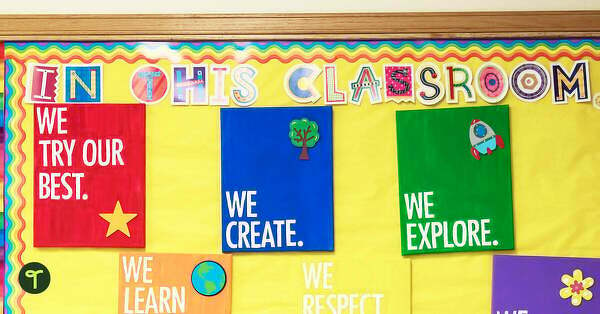
How to Make Classroom Rules Pupils Will Actually Follow (Tips From Veteran Teachers)
Learn to create classroom rules your primary pupils will follow this school year with tips from veteran teachers, plus suggestions of good rules.

Halloween Crafts and Activities for Spooky Learning
Are you looking for Halloween crafts and ctivities that are fun and educational? Check out these ideas to make your classroom spooky and smart!

Digital Teacher Planners | Why and How Teachers are Planning Digitally
Are you wondering what all the fuss is about with digital teacher planners?
Get more inspiration delivered to your inbox!
Sign up for a free membership and receive tips, news and resources directly to your email!
223 Copy and Paste Final Report Card Comments

Chris Drew (PhD)
Dr. Chris Drew is the founder of the Helpful Professor. He holds a PhD in education and has published over 20 articles in scholarly journals. He is the former editor of the Journal of Learning Development in Higher Education. [Image Descriptor: Photo of Chris]
Learn about our Editorial Process
Hey, Teacher! Is it report writing time again?
Hopefully these comments for student report cards will come in helpful.

Copy and paste these report card comments for your students. It’ll save you time and heartache!
Read below for my full list of report card comment ideas:
Positive Comments
Use a few positive comments to show the strengths of the student and how they’ve improved recently.
Positive Attitude to Learning
- Comes to class every day ready and willing to learn.
- Has an inquisitive and engaged mind.
- Is excited to tackle her tasks every day.
- Likes to come to school and learn with her friends.
- Has a positive attitude to self-development.
- Tends to come into the classroom with a big smile and an open mind.
- Sets herself very high standards and strives to meet them each and every day.
Showing Improvement
- Is consistently improving.
- Is developing very well for her age.
- Has shown strong signs of growth in all learning areas.
- Has made clear and commendable gains.
- Improves each and every day.
- Her hard work and effort has paid off.
Positive Behavior
- Is always very well behaved during class time.
- Has a good ability to avoid peers who she sees may be distractions to her learning.
- Is always willing to listen to instructions.
- Is a very helpful and respectful student.
- Never misbehaves in class.
- Sets a good standard for classmates to follow.
- Is very good at following the rules.
Read Also: Words to Describe a Student
Shows Respect for Others
- Has a great deal of respect for all visitors to the classroom.
- Cares for and respects her classmates.
- Is always respectful to classroom equipment.
- Always puts her hand up and follows instructions.
- Is very considerate of others and often puts others’ needs and interests at the front of her mind.
- Is a very respectful and responsible classmate.
- Has proven to be a courteous and polite classmate.
- Is held in high regard for her kindness to others.
- Is a very outgoing, positive and upbeat student.
- Tackles every task with enthusiasm and self-belief.
- Is building her confidence more and more every day.
- Has shown remarkable growth in confidence this year.
- Has reached many achievements this year, which is reflected in her budding confidence.
- Is a self-assured young learner who is always willing to try something new.
- Can always be trusted with tasks assigned to her.
- Conducts herself with honesty and integrity at all times.
- Is trusted with school equipment including expensive computer technology.
- Is open, honest and upfront about her thoughts and beliefs.
- Shares thoughtful and genuine opinions during lessons.
- Is always willing to self-reflect and provide genuine analyses of her progress.
Self-Expression
- Is a very expressive and confident student.
- Has a great ability to express thoughts and feelings in writing.
- Is always willing to express herself in front of the class with a bold and confident voice.
- Has artistic talent and can articulate her thoughts through drawing and painting very well.
- Is a very articulate public speaker when talking about issues that she knows well.
- Is always willing to contribute her own thoughts and beliefs in class discussions.
- Uses her body and hand movements to express herself artistically.
High Motivation
- Has a great deal of intrinsic motivation . She’s a real go getter!
- Has bucket loads of initiative.
- Has an active mind and is eager to achieve.
- Comes to class with a huge willingness to participate.
- Never wants to waste a day in the classroom.
- Loves to soak up all the information around her.
- Is an ambitious and proactive student.
- Knows her goals and strives every day to achieve them.
Strong Communication Skills
- Projects her voice very well when communicating in class.
- Is effective at using the written word to express herself.
- Has a great deal of confidence when speaking to groups.
- Is very good at clearly and succinctly speaking up when she feels she has a valuable contribution.
- Consistently provides valuable contributions to class discussion.
- Is a skilled public speaker.
- Has shown great strides in written communication skills in recent months.
Is Neat and Tidy
- Always keeps her belongings neatly organized.
- Looks after her belongings very carefully.
- Always has neat book work which shows respect and high regard for her own work.
- Keeps her desk space very tidy, clean and organized.
- Takes pride in keeping her work neat, clean and tidy for every submission.
- Keeps her personal work spaces very well organized.
Good Listening Skills
- Is an active listener who is always ready to respond with relevant and engaging questions.
- Listens thoughtfully to other people’s ideas and contributes her own thoughtful ideas.
- Listens with an open mind to her classmates’ perspectives.
- Always listens intently with the hope of learning new things.
- Concentrates and pays close attention during demonstrations to ensure she understands task requirements.
- Takes directions well and is quick to apply directions to tasks.
- Is always attentive in class and asks for clarification when required.
- Is good at working in small groups unaided by a teacher.
- Listens intently to others and takes their opinions in mind.
- Excels when given leadership roles in small groups.
- Appears to thrive in group learning situations.
- Has developed strong skills in communicating in groups.
- Works productively in groups of all sizes to get tasks done.
- Has a knack for managing multiple personalities in group situations.
- Could work on sharing resources more fairly during group tasks.
- Needs to work on allowing other group members equal time to speak during group discussions.
Strong Organization and Time Management
- Always arrives to class on time with her books and is ready to learn.
- Is exceptionally good at completing tasks in a timely manner.
- Is a natural organizer and is often seen helping to get her peers organized and ready for tasks.
- Is always trusted to meet deadlines.
- Uses color coding and headings in her books effectively to organize her notes.
- Keeps a neat and organized work space at all times.
Good at Homework
- Always comes to class with very neat and well written homework.
- Tends to complete independent homework tasks with ease.
- Thrives with independent homework tasks, which are always presented in a timely manner.
- Comes to class with great questions based on the assigned homework tasks, showing thoughtfulness and independence.
- Can be trusted to complete her homework in time.
- Often asks for extra homework. She has shown great thirst for knowledge.
Read Also: 27 Pros and Cons of Homework
Strong Participation
- Is always willing to jump in and participate in any task.
- Is a great helper, always giving people a hand when she sees they are in need.
- Participates in all tasks, no matter her skill level. This enthusiasm is laudable.
- Always comes to class willing to get involved in the daily activities.
- Is always the first person to put their hand up to volunteer for a task.
- Loves to learn by getting involved and gaining first-hand experiences.
- Is beginning to develop her own interest and is eager to learn more about them.
- Has a strong personal interest in ________ and has been taking the initiative to explore the topic.
- Is very enthusiastic about ________ and has shown great promise in this area.
- Has picked a great extracurricular hobby of _____. Her skills learned in this hobby has helped to boost her confidence in the classroom.
- Shows interest in a variety of different topics which she has been enthusiastically exploring during free study time.
- Always finds personal interest in topics presented in class.
Independence
- Is showing increasing independence to learn and study without the need for excessive guidance.
- Is a fiercely independent person who knows what she wants and goes out to get it.
- Has an independent and free spirited mind.
- Is not afraid to go against the majority if she is certain of her beliefs and thoughts.
- Happily goes about her tasks independently but seeks help when required.
- Shows confidence striking out on her own to do things she is interested in.
Strong Learning and Thinking Skills
- Is very resourceful and uses the internet, books and peers to find new knowledge.
- Is aware of her learning styles and makes every effort to work to her strengths as a student.
- Uses higher-order thinking strategies like analysis and critique to question assumptions.
- Knows when she needs help and asks for it willingly.
- Thinks deeply about her responses before providing them.
- Is very good at reflecting on her weaknesses and working on them to grow as a person.
- Is great at solving problems using her own initiative.
Good Attention to Detail
- Pays close attention to the details of a tasks so that she doesn’t miss anything.
- Is very systematic about going about her tasks so she can complete them thoroughly.
- Is great at identifying small and nuanced mistakes in her own work.
- Always creates very presentable and professional looking pieces of work.
- Has great self-reflection skills , being able to identify her own strengths and weaknesses.
- Can pause and look at her own work to identify areas for improvement.
- Has the ability to stop and change course when she identifies areas for improvement.
- Is very good at identifying and repairing errors in drafts.
- Has exercised great thoughtfulness about her own capabilities.
- Has shown the ability to empathize with classmates and show great compassion.
Perseverance and Determination
- Shows great determination when is set a challenging task.
- Perseveres through difficulties to achieve her goals.
- Is resilient in the face of significant challenges and problems presented.
- Will always work through struggles and come out the other end more confident and skilled.
Constructive Comments
Present constructive comments to show the areas for improvement for the student. Carefully craft the comments so they’re not overly upsetting or impersonal.
Negative Attitude to Learning
- Occasionally needs special assistance to stay on task.
- Requires some coaxing to complete tasks.
- Is at times distracted or uninterested in learning.
- Is working on paying more attention to her tasks.
- Has some off days where she is uninterested in learning.
- Is easily distracted by friends.
- Will often come to class unwilling to contribute to group discussions.
Needs Improvement
- Needs to work on focus and concentration during class time.
- Has improved in some areas, but continues to slip behind in others.
- Is showing some lack of focus and is slipping behind in some subjects.
- There is still a lot of room for growth and we are working on improving her focus and drive in coming months.
- It would be great to see some improvement in her weakest subjects in the future.
- I would like to see her asking for help when stuck on tasks.
Disruptive Behavior
- Can occasionally disrupt her friends and classmates.
- Is at times a distraction to other students.
- Can be unsettled when entering the class after breaks.
- Can be talkative during quiet times and individual tasks.
- Could work on being more considerate to other classmates.
- Has had a difficult time getting comfortable in class this year.
- Has at times sought undue attention and distracted the flow of lessons.
Read Also: 13 Best Classroom Management Theories
Low Motivation
- Sometimes struggles to engage in class discussions.
- Requires a lot of external rewards to get focused.
- Works well below her capabilities due to lack of motivation to do her best.
- Relies heavily on extrinsic motivation. It would be great to see more intrinsic desire to succeed in coming months.
- Struggles to find things she is interested in.
- Has trouble getting engaged and interested in class topics.
- Will respond well to rewards but struggles to use initiative.
- Needs to dig deep and find greater motivation to learn in coming months.
Is Not Neat and Tidy
- Occasionally presents work that is messy and difficult to read.
- I would like to see her paying more attention to neatness in her writing.
- It would be great to see her showing more care for her workspace to ensure all her belongings are well cared for.
- At times comes to class disheveled and disorganized.
- Presents homework that is untidy and appears to have been rushed.
- Needs to work on ensuring her work is presentable, neat, and error-free.
Weak Communication Skills
- Speaks very softly. An area for improvement is speaking up in class discussions.
- Could work some more on communicating her opinions during discussions.
- Is often shy and intimidated when asked to speak up in class discussions.
- Needs coaxing to share her thoughts in class.
- Can work on being clearer when expressing her thoughts in writing.
- I look forward to seeing further development in expressing her thoughts in class.
Poor Listening Skills
- Has had some trouble paying attention to others during class discussions.
- Has some trouble listening to peers and teachers.
- Is easily distracted during class discussions.
- Is a good talker but needs to work on pausing and listening to others more attentively.
- Is often fidgety and distracted when spoken to.
- Is often resistant to make eye contact and be responsive when spoken to.
- Has trouble repeating and remembering instructions.
Read Also: 47 Best Classroom Rules for Middle and High School
Weak Organization and Time Management
- Tends to leave tasks to the last minute.
- Often submits incomplete drafts due to poor time management.
- Is often disorganized and forgets important school supplies.
- Has submitted homework late on several occasions.
- Could work on using her time more efficiently to complete tasks in allotted time periods.
- I would like to see her working on her organizational skills in coming months so she can use her class time more efficiently.
Bad at Homework
- Will often skip assigned homework tasks.
- Regularly forgets to bring homework to school.
- Her homework is often brought to class incomplete and rushed.
- Is often seen completing homework tasks the morning before they are due.
- I would like to see her working on setting aside more time for homework in the coming months.
- Is good at class work, but needs more initiative to complete her weekly homework in a timely manner.
Poor Attention to Detail
- Could be getting higher grades if she edited her work more carefully before submission.
- Will sometimes make mistakes due to distractedness and carelessness.
- Has started to let carelessness seep into his work for the past few months.
- Often does not pay enough attention to test questions, leading to small unforced errors.
Preschool and Kindergarten Comments
Here are some great comments specifically for children in the early years of their development.
Play Based Learning – Strong
- Plays well with other children.
- Shares resources with her peers during play time.
- Has begun to develop cooperative play skills such as sharing and taking turns.
- Is a creative and imaginative learner.
- Engages in strong exploratory and discovery play behaviors without prompting.
- Is enthusiastic and engaged when given developmentally appropriate resources to play with.
- Thrives in unstructured play environments where she can explore, learn and discover in her own time.
- Has started to use extended vocabulary well during play scenarios.
- Is great at taking measured risks during play which reveals great self-confidence for her age.
Play Based Learning – Needs Improvement
- Plays in parallel with other children, but needs to start developing cooperative play strategies in the coming months.
- Is good at solitary play, but needs more practice sharing and playing with other students.
- Is curious about playing with others, but often sits back due to shyness.
- Needs encouragement to use more language skills during play-based learning .
- Struggles to take turns when playing with others.
Strong Development
- Is developing in an age appropriate way and continues to show good progress.
- Has visibly developed fine and gross motor skills during class sessions.
- Is using language at an age appropriate level.
- Is starting to move out of her comfort zone to explore more and more new challenges.
- Is socially, cognitively and physically on track for transition to school.
Socialization
- Has shown remarkable strides in communication skills at preschool.
- Plays well with others.
- Is a thoughtful and kind student who plays well with others.
- Always shares and thinks about others during play scenarios.
- Is a popular student who finds it very easy to make friends with other children.
- Has been seen to show some great emerging leadership skills during play scenarios.
- Is very happy to play in groups and learn from peers .
Final Thoughts
I will often start with a comment bank like the one above. For each student, I’ll copy four or five of the most suitable statements.
But, I will also follow-up my generic comment from the comment bank with a specific example for the parents to read.
Parents do like to see that you have provided specific and thoughtful statements – so don’t forget to use the student’s name and specific anecdotes as much as possible.
I do hope this comment bank for report card comments has come in handy for you.
Remember to also maintain a positive but honest and constructive voice when writing.
If there is serious concern that might be difficult to express in writing, you should arrange for a parent-teacher conference to have a discussion and see how things progress.
Good luck with your report card writing!
About The Author: Hi, I’m Chris Drew (Ph.D) and I run things around here. I’m an Education expert and university professor.

- Chris Drew (PhD) https://helpfulprofessor.com/author/chris-drew-phd-2/ 101 Class Group Name Ideas (for School Students)
- Chris Drew (PhD) https://helpfulprofessor.com/author/chris-drew-phd-2/ 19 Top Cognitive Psychology Theories (Explained)
- Chris Drew (PhD) https://helpfulprofessor.com/author/chris-drew-phd-2/ 119 Bloom’s Taxonomy Examples
- Chris Drew (PhD) https://helpfulprofessor.com/author/chris-drew-phd-2/ All 6 Levels of Understanding (on Bloom’s Taxonomy)
Complaint Letter to School Principal from Parent Sample
In this article, I’ll share a step-by-step guide on how to write a complaint letter to the school principal from a parent, complete with a template and tips from my personal experiences.
Key Takeaways: Understand the Purpose : Know why you’re writing and what you aim to achieve. Be Clear and Concise : State your concerns clearly without unnecessary details. Provide Evidence : Attach or reference any relevant documents or incidents. Be Respectful : Maintain a respectful and professional tone throughout the letter. Follow Up : Consider following up if you do not receive a timely response. Template Provided : Use the template provided below as a starting point for your letter. Personal Experience Tips : Benefit from insights gained from my extensive experience in writing such letters.
Step-by-Step Guide to Writing Your Letter
Step 1: start with your contact information.
Begin your letter by providing your name, address, contact number, and email at the top. This ensures the principal knows who is reaching out and how to respond.
Step 2: Add the Date and Principal’s Contact Information
Include the date of writing the letter and the principal’s name and school address below your contact information.
Step 3: Write a Polite Salutation
Start with a respectful salutation such as “Dear [Principal’s Name],”.
Step 4: Clearly State the Purpose of Your Letter
In the opening paragraph, clearly state that you are writing to lodge a complaint, specify the nature of the complaint, and mention your child’s name and class.
Step 5: Describe the Issue in Detail
Trending now: find out why.
Provide a detailed account of the issue, focusing on facts. Mention specific dates, incidents, and the names of individuals involved (if relevant).
Step 6: Express Your Concerns and Expectations
Clearly articulate why the issue concerns you and what outcomes you expect or suggest as a resolution.
Step 7: Attach or Reference Supporting Documents
If you have any relevant documents or evidence, mention that they are attached or available upon request.
Step 8: Conclude with a Call to Action
End the letter by requesting a meeting or a response by a specific date, expressing your hope for a constructive resolution.
Step 9: Close with a Respectful Sign-off
Conclude your letter with a sign-off such as “Sincerely,” followed by your name and signature.
Template for a Complaint Letter
[Your Name] [Your Address] [City, State, Zip] [Email Address] [Phone Number] [Date]
[Principal’s Name] [School’s Name] [School’s Address] [City, State, Zip]
Dear [Principal’s Name],
I am writing to express my concern regarding [specific issue] that has affected my child, [Child’s Name], who is in [grade/class]. [Describe the issue, including dates, specific incidents, and individuals involved].
This situation is concerning because [explain why the issue is problematic, focusing on its impact on your child or the educational environment].
I believe this issue can be resolved by [suggest possible solutions or actions you expect the school to take]. To support my concerns, I have attached [mention any attached documents].
I would appreciate the opportunity to discuss this matter further and am hopeful for a constructive resolution. Please let me know a convenient time for a meeting, or I look forward to your response by [specific date].
Thank you for your attention to this matter.
Sincerely, [Your Signature (if sending a hard copy)] [Your Printed Name]
Tips from Personal Experience
- Keep Emotions in Check : While it’s natural to be emotional, a calm and reasoned approach is more effective.
- Document Everything : Keep a record of all communications and relevant incidents.
- Seek Solutions, Not Blame : Focus on finding a constructive resolution rather than assigning blame.
- Be Specific : Vague complaints are hard to act on. Provide clear, concise details.
- Follow Up : If you don’t receive a response, don’t hesitate to send a polite follow-up or arrange a meeting.
Frequently Asked Questions (FAQs)

Q: How can I effectively express my concerns in a complaint letter to the principal about my child’s classroom environment?
Answer: When writing a complaint letter to the principal, it’s essential to be clear and concise. I always start by stating my child’s name and class, followed by a brief description of the issue.
I focus on facts and avoid emotional language. It’s also helpful to suggest possible solutions or outcomes you’d like to see. Lastly, I always request a meeting to discuss the matter further.
Q: What should I include in the letter if I’m concerned about bullying towards my child at school?
Answer: In cases of bullying, it’s crucial to provide specific examples and dates of the incidents. I include any steps my child or I have already taken, like speaking to the teacher.
I emphasize the impact of bullying on my child’s well-being and learning. Confidentiality is key, so I request discretion and a prompt response to address the issue effectively.
Q: Is it appropriate to email the principal about my concerns, or should I send a physical letter?
Answer: I’ve found that emailing can be very effective. It’s faster and ensures there’s a written record of your communication. In my email, I keep the tone respectful and formal, just as I would in a physical letter. I also make sure to follow up if I don’t receive a response within a reasonable time frame.
Q: How do I approach the principal if my concern is about a specific teacher’s methodology or behavior?
Answer: When my concerns have been about a teacher, I approach the letter with a tone of seeking understanding rather than placing blame. I describe specific incidents or methods that concern me and how they affect my child.
It’s important to express a willingness for open dialogue and to hear the school’s perspective as well.
Q: Can I ask for a specific action or change in my complaint letter, or should I just state the problem?
Answer: It’s actually helpful to suggest specific actions or changes that you believe would resolve the issue. In my letters, I outline my desired outcomes clearly but respectfully. This helps the principal understand my perspective better and provides a starting point for finding a solution.
Related Articles
Free sample complaint letter to landlord, letter asking for compensation sample: free & effective, sample complaint letter to principal about teacher behaviour: free & effective, strong complaint email for poor service: the simple way, overcharged electricity bill complaint letter: free & customizable, formal complaint against coworker sample: free & helpful, leave a comment cancel reply.
Your email address will not be published. Required fields are marked *
Start typing and press enter to search
- Letter Writing
- Formal Letter Writing In English
- Letter to the Principal
Letter to Principal - Format and Sample Letters
If you are a school student, you would have definitely come across many scenarios where you have had to write a letter to the principal of your school. The reasons might vary. From requesting leave because you are sick or going on a vacation to seeking permission to participate in competitions or sports events, you are always required to submit the leave letters. This article will give you a detailed explanation of the format of writing a formal letter to principal and also provide you with examples that would aid you to write one on your own.
Table of Contents
Writing a formal letter to school principal – format and points to remember, request letter to principal for an on duty application of two days, write a letter to your principal seeking permission to attend a family function, write a letter to the principal of your school requesting leave for a week to take care of your sick mother, letter to your principal seeking permission for a re-examination.
- FAQs on Writing a Letter to School Principal
A letter to the principal is always written for particular reasons, and it has to be in the format of a formal letter . You have to make sure that you provide all the necessary information promptly. This includes the receiver’s address, date, subject stating the reason for leave, salutation, body of the letter explaining the purpose of your letter, complimentary closing and signature. All these components have to be aligned to your left-hand side margin.
When writing the letter, see to it that you mention precisely the dates on which you require leave, or you would be absent to school because this serves as a record for attendance keeping, leave management and other documentation purposes.
Sample Letters to Principal
Go through the sample letters given below for your reference and better understanding.
The Principal
National Model Public School
Chennai – 600054.
Subject: Request for On-Duty application for two days
Respected Sir,
I am Mithuna M, a student of Class X C. I have been selected to participate in the State Level Athletic Competitions that is to be held on the 15th and 16th of this month at the M A Chidambaram Stadium, Chepauk. I require an attested on-duty application to be able to represent the school and participate in the competitions. I request you to kindly provide me with a bonafide certificate and an on-duty application so that I would not lose my attendance.
Thanking you
Yours sincerely,
Roll No. 32
The Headmistress
St. Francis Anglo Indian Girls High School
Noida – 110096
25 th November, 2021
Subject: Seeking permission to attend a family function
Respected Ma’am,
I am writing to seek your permission for me to attend a family function on the 29 th of November at Bangalore. I would require a leave of three days (from 28.11.2021 to 30.11.2021). I have taken permission from my Class Teacher, and I will ensure that I keep myself informed about the daily lessons and complete everything up-to-date when I am back. Kindly consider my request and grant me permission.
Saajan Jose
Roll No. 36
Zion Public School
Allahabad – 211008
Subject: Requesting one week’s leave
This is to inform you that my mother is seriously ill and I am required to stay with her as there is no one else to take care of her. She is required to be taken to the hospital every now and then and needs constant support as doctors have advised complete bed rest. So, I request you to kindly allow me a week’s leave, starting today, 16/09/2021 to 23/09/2021.
My friends have assured me to bring every day’s notes, and I will submit all my work through them. My Class Teacher is also very supportive. She has promised to send me audio recordings of classes so that I would not miss out on anything during this period. With everyone’s support, I am sure I can get through this difficult phase.
Thank you in advance for your kind understanding.
Yours faithfully,
Student of Class XII A
Roll No. 12
GD Matriculation Higher Secondary School
Kachery Road, Chelannur
Kerala – 673001
July 19, 2021
Subject: Seeking permission for a re-examination
This letter is in regards to Thomas Roy, student of Class VIII A. He was not able to attend the Maths examination as he was hospitalised. He has recovered completely now and is ready to take the re-examination. It was discussed earlier that he could have a re-examination as he could not attend the exam owing to his illness.
We are willing to work with his Class Teacher, Mrs. Joyce and his Maths Teacher, Mrs. Roseline and fix a date for the re-examination. We wanted to make an official intimation of the matter before we proceeded with it. Kindly give us a heads up so that we can go forward with it.
Rayana Philip
Mother of Thomas Roy
Frequently Asked Questions on Writing a Letter to School Principal
How can i start a letter to the school principal.
Start your letter with the address and date, followed by the subject, salutation and then the body of the letter in which you convey the reason behind your letter.
What kind of letter do I write to the Principal?
A letter to the School Principal or any higher authority should always be in the format of
a formal letter as it is concerned with matters of personal and professional importance.
The language used should be formal as well.
Is it important to mention the dates on which I am taking leave?
It is important to clearly mention the date on which you would be absent from school because it gives clarity and is also used for attendance management and documentation.
| ENGLISH Related Links | |
Leave a Comment Cancel reply
Your Mobile number and Email id will not be published. Required fields are marked *
Request OTP on Voice Call
Post My Comment
Register with BYJU'S & Download Free PDFs
Register with byju's & watch live videos.
- International
- Education Jobs
- Schools directory
- Resources Education Jobs Schools directory News Search
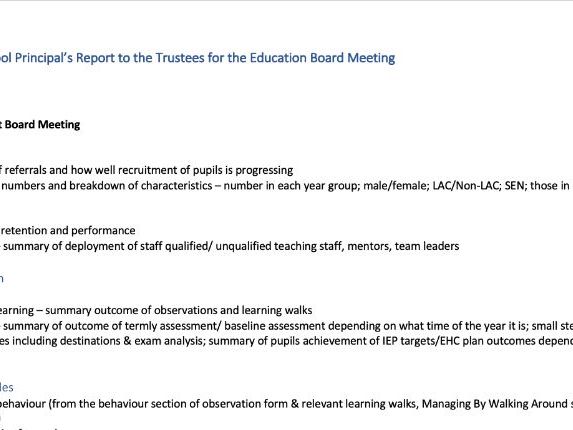
Template for School Principal's Report to the Board
Subject: Whole school
Age range: Age not applicable
Resource type: Other
Last updated
23 September 2022
- Share through email
- Share through twitter
- Share through linkedin
- Share through facebook
- Share through pinterest

Template for School Principal’s Report to the Board
Tes paid licence How can I reuse this?
Your rating is required to reflect your happiness.
It's good to leave some feedback.
Something went wrong, please try again later.
This resource hasn't been reviewed yet
To ensure quality for our reviews, only customers who have purchased this resource can review it
Report this resource to let us know if it violates our terms and conditions. Our customer service team will review your report and will be in touch.
Not quite what you were looking for? Search by keyword to find the right resource:
- Trying to Conceive
- Signs & Symptoms
- Pregnancy Tests
- Fertility Testing
- Fertility Treatment
- Weeks & Trimesters
- Staying Healthy
- Preparing for Baby
- Complications & Concerns
- Pregnancy Loss
- Breastfeeding
- School-Aged Kids
- Raising Kids
- Personal Stories
- Everyday Wellness
- Safety & First Aid
- Immunizations
- Food & Nutrition
- Active Play
- Pregnancy Products
- Nursery & Sleep Products
- Nursing & Feeding Products
- Clothing & Accessories
- Toys & Gifts
- Ovulation Calculator
- Pregnancy Due Date Calculator
- How to Talk About Postpartum Depression
- Editorial Process
- Meet Our Review Board
9 Tips for Talking to the Principal About Bullying
Burger/Phanie / Getty Images
- Discuss Face-to-Face
- Become Allies
Be Respectful
- Leave Baggage at Home
Come Prepared
Provide details.
- Listen to Their Perspective
- Ask About Next Steps
- Schedule a Follow Up
It is no secret that school bullying can be an overwhelming issue to deal with, especially when your child is the victim. Aside from trying to help your child navigate the situation and overcome the pain , you are also faced with how to address the issue with the school.
Many times, the first person you will speak with is the teacher. However, for older students, there may not be a specific teacher for you to contact, especially if the bullying occurred on the bus or at lunch.
This means your next logical step is to go to the principal. Consequently, many parents find the very thought of this step very unsettling. But, it need not be stressful. Follow these nine tips for talking with your child’s principal and everything will progress smoothly.
Discuss Face-to-Face
When dealing with something as significant as bullying , it is important that you set a meeting with the principal. Try to avoid email because it can be misinterpreted too easily. Instead, ask for an early morning meeting.
Meeting in the morning is usually more productive because the principal may feel more refreshed.
You also should avoid gossiping about the bully, posting information on social media or venting online. These actions just muddy the waters and put your child at risk for more bullying. They also may put the principal on the defensive.
Become Allies
Go into the meeting believing that the principal wants to help you and your child. Too many times parents assume that the school is to blame or that nothing will be done. Do not let your anger and frustration over the bullying impact the way you treat the principal.
Even if you disagree on some aspects of the situation, find a way to forge a partnership where your child can be protected from further bullying. Also, avoid blaming the principal for the bully's decisions. Instead, focus on how the principal intends to keep your child safe.
Avoid being critical or blaming the school for your child’s treatment. Keep in mind that while schools can guide students, the students still make their own choices. The person responsible for the bullying is the bully, not the principal.
While the school has a responsibility to keep your child safe , being overly critical or judgmental will derail the conversation. If you are unable to keep your emotions under control, you run the risk that the principal will focus more on your tone and your words rather than on the issue at hand.
Leave Baggage at Home
Many times, parents mistakenly let something that happened in their childhood cloud their thinking, especially if a childhood bullying situation was mishandled. Be careful not to let your negative experiences get in the way of protecting your child.
Focus on your child's situation and refrain from assuming that history will repeat itself.
Make some notes on what you want to say. Because bullying is an emotional topic, it is easy to get distracted or forget what you want to say. As a result, be sure you jot down the key points you want to address with the principal. This way, if you get nervous or upset, you have something to refer to that will help keep you on track.
It is important that you explain in detail what you are seeing and how it is affecting your child. Share any documentation you have of the bullying including the witnesses to the bullying , what was said or done, and how it impacted your child.
The more factual information you can provide, the better. Try to avoid getting too emotional when sharing the details. It is important that the principal hear what you have to say and not be distracted by an emotional encounter.
Listen to Their Perspective
As hard as it is to listen when all you really want to do is be heard, it will benefit you and your child in the long run. And, if you do not understand any of the information provided, or if it doesn’t match what your child told you, be sure to ask questions. Just try to do so respectfully. The goal is that both you and the principal can find some common ground on the situation.
Ask About Next Steps
Find out what the principal plans to do when your meeting ends. For instance, will he be talking with the bully or interviewing bystanders ? What about changing your child’s schedule, moving her locker or providing her with a mentor?
Remember, the goal is that your child is protected. Do not leave the meeting without some understanding of what happens next.
Meanwhile, do not expect to know the full details of what will happen to the bully. This type of information is usually kept confidential due to the fact that it involves a minor. What's more, your focus should not be on getting justice. Focus instead on your child's healing and protection. Be sure to document what was said, the date, the time and any other pertinent information.
Schedule a Follow Up
Many times, bullying will not end right away. In fact, once you have reported it, bullying may escalate and get worse. Be prepared for this and keep the lines of communication open with your child. It also takes time to investigate the bullying and implement consequences.
As a result, you want to have a date on the calendar to check in the with principal again. This way, you can ask for the status of the situation and find out what the school is doing to end the bullying. You also can share how your child is doing and make adjustments to the plan the school has put in place.
A Word From Verywell
Dealing with a bullying situation is never easy. But it is always in the best interest of your child to address the situation and take steps to keep your child safe. Just be sure your child is ready for your involvement with the school. Sometimes kids want to try to diffuse the situation on their own first.
Unless the bullying involves violence of some sort, this is an acceptable approach and can be empowering for your child. Do not rush to talk with the principal without first considering your child's wants and needs. It is always best if you go at their pace.
KidsHealth from Nemours. Helping kids deal with bullies .
US Department of Health and Human Services. Prevention at school .
US Department of Health and Human Services. Find out what happened .
KidsHealth from Nemours. What is cyberbullying? .
By Sherri Gordon Sherri Gordon, CLC is a published author, certified professional life coach, and bullying prevention expert.
- Letter to Principal Requesting Teacher Change
If you are a concerned parent or guardian seeking to request a change of teacher for your child, we understand that the decision to do so can be difficult. To assist you in this matter, we have provided 5 professionally written letter templates to help you communicate your request to the school's principal clearly and effectively.
We hope that our templates will provide you with the necessary guidance and support to help your child receive the best education possible. Simply choose the template that best suits your situation, customize it with your details, and send it to the school's principal.
We hope that our templates will be of assistance in this matter, and wish you and your child all the best.
Subject: Request for Change of Teacher for [Student's Name]
Dear [Principal's Name],
I am writing to request a change of teacher for my child [Student's Name], who is currently studying in [Grade] in [Teacher's Name]'s class. Unfortunately, my child is facing several issues with their current teacher, which is affecting their academic performance and mental well-being.
I would like to request a change of teacher for my child, and I kindly request your assistance in this matter. My child's academic progress is of utmost importance to me, and I believe that a change in teacher would be beneficial for them.
Thank you for your attention to this matter, and I look forward to hearing back from you soon.
[Your Name]
I am writing to request a change of teacher for my child [Student's Name], who is currently studying in [Grade] in [Teacher's Name]'s class. Unfortunately, my child is facing several issues with their current teacher, which is affecting their academic progress and overall learning experience.
I kindly request your assistance in this matter and would appreciate it if you could assign a different teacher for my child. I believe that a change in teacher would be helpful for my child's academic and personal growth.
Thank you for your understanding and prompt action in this matter.
I am writing to request a change of teacher for my child [Student's Name], who is currently studying in [Grade] in [Teacher's Name]'s class. Unfortunately, my child is not responding well to the teaching methods used by their current teacher, and I believe that a change in teacher would be beneficial for my child's academic progress.
I would appreciate it if you could kindly consider my request and make the necessary arrangements for a change of teacher for my child.
Thank you for your attention to this matter.
I am writing to request a change of teacher for my child [Student's Name], who is currently studying in [Grade] in [Teacher's Name]'s class. Unfortunately, my child is facing difficulties in understanding the subjects being taught by their current teacher, which is affecting their academic progress.
I would like to request your assistance in this matter and kindly ask for a change of teacher for my child. I believe that a change in teacher would help my child to better understand the subject matter and improve their academic performance.
I am writing to request a change of teacher for my child [Student's Name], who is currently studying in [Grade] in [Teacher's Name]'s class. Unfortunately, my child is not comfortable with their current teacher, and I believe that a change in teacher would be beneficial for their emotional and mental well-being.
I kindly request your assistance in this matter and would appreciate it if you could assign a different teacher for my child. I believe that a change in teacher would help my child feel more comfortable and motivated to learn.
Thank you for your understanding and consideration in this matter.
We are delighted to extend our professional proofreading and writing services to cater to all your business and professional requirements, absolutely free of charge at Englishtemplates.com . Should you need any email, letter, or application templates, please do not hesitate to reach out to us at englishtemplates.com. Kindly leave a comment stating your request, and we will ensure to provide the necessary template at the earliest.
Posts in this Series
- Request for Permission to Pay Fees Late
- Appreciation Letter to Teacher from Principal
- Request for College Leaving Certificate
Home » Letters » School » Report Letter to Principal for Industrial Visit – Industrial Visit Report Sample
Report Letter to Principal for Industrial Visit – Industrial Visit Report Sample
Table of Contents:
- Sample Letter
Live Editing Assistance
How to use live assistant, additional template options, download options, share via email, share via whatsapp, copy to clipboard, print letter, sample industrial visit report sample.
To, The Principal, ______________ (Name of the School), ______________ (Address)
Date: __/__/____ (Date)
From, ______________ (Name of the Student), ______________ (Class)
Subject: ____________ (Name of the Place) Industrial visit report
Respected Sir/Madam,
With due respect, I am _____________ (Name of the Student), studying in class ____________ (Class) in your school. I am writing this letter to present before you the visit we had on _____________ (Date) for ______________ (Subject) at __________________ (Name of the Place).
I would like to state that students of class _________ (Class) visited __________ (Name of the place) on _________ (Date). To begin with, we went to _____________ (Mention the events orderly) next we headed to _______________ (Next major event). We had our lunch at ________ (Time) in ______________ (Name of the hotel). ________ (Mention all the events and details for e.g. – eventually, next in the list, moving forward, moreover, initially, last activity)
Thank you so much for giving us this opportunity to learn and explore. We have gained much practical knowledge and we will be submitting an individual project report soon.
Yours Faithfully/Obediently, ____________ (Name of the Student), ____________ (Class)
Live Preview
The Live Assistant feature is represented by a real-time preview functionality. Here’s how to use it:
- Start Typing: Enter your letter content in the "Letter Input" textarea.
- Live Preview: As you type, the content of your letter will be displayed in the "Live Preview" section below the textarea. This feature converts newline characters in the textarea into <br> tags in HTML for better readability.
The letter writing editor allows you to start with predefined templates for drafting your letters:
- Choose a Template: Click one of the template buttons ("Start with Sample Template 1", "Start with Sample Template 2", or "Start with Sample Template 3").
- Auto-Fill Textarea: The chosen template's content will automatically fill the textarea, which you can then modify or use as is.
Click the "Download Letter" button after composing your letter. This triggers a download of a file containing the content of your letter.
Click the "Share via Email" button after composing your letter. Your default email client will open a new message window with the subject "Sharing My Draft Letter" and the content of your letter in the body.
Click the "Share via WhatsApp" button after you've composed your letter. Your default browser will open a new tab prompting you to send the letter as a message to a contact on WhatsApp.
If you want to copy the text of your letter to the clipboard:
- Copy to Clipboard: Click the "Copy to Clipboard" button after composing your letter.
- Paste Anywhere: You can then paste the copied text anywhere you need, such as into another application or document.
For printing the letter directly from the browser:
- Print Letter: Click the "Print Letter" button after composing your letter.
- Print Preview: A new browser window will open showing your letter formatted for printing.
- Print: Use the print dialog in the browser to complete printing.
- An industrial visit report should include details such as the date of the visit, the place visited, events attended, major activities, and any significant observations or learnings.
- Yes, expressing gratitude towards the principal for the opportunity demonstrates respect and appreciation for the educational experience.
- Phrases like "to begin with," "next," "moreover," and "lastly" can be used to provide a structured and organized overview of the visit.
- Yes, mentioning plans for further submission of project reports shows commitment and accountability towards completing the educational requirements related to the visit.
- Yes, addressing the principal with respect, using titles like "Respected Sir/Madam," maintains professionalism and courtesy in communication.
Incoming Search Terms:
- report of industrial visit format
- how to write a conclusion for an industrial visit report
- one day industrial visit report sample
By letterskadmin
Related post, request letter to principal for organizing science fair – sample letter requesting for organization of science fair.
Request Letter for Participation in Cultural Event – Sample Letter Requesting for Participation in Cultural Event
Request letter for changing optional subject – sample letter to school principal requesting for change of optional subject, leave a reply cancel reply.
You must be logged in to post a comment.
Request Letter for Permission to Start a New Club – Sample Letter Requesting to Start a New Club in School
Privacy overview.
trending now in World News

French 'Excalibur' sword vanishes after 1,300 years as the sword...

Archaeologists discover ancient relic believed to be tied to...

Forklift needed to haul away massive 24-foot shark that washed up...

Female prison officer arrested after she's allegedly filmed...

Inmate filmed having sex with prison guard has 7-months pregnant...

Israeli strike kills a senior Hezbollah commander in south Lebanon

Young aspiring chef falls from seat before flight's takeoff,...

At least 30 injured after Boeing flight hits turbulence, sending...
Breaking news, beloved teacher dies after falling through school skylight in freak accident.
Thanks for contacting us. We've received your submission.
A much-loved former principal has tragically lost his life in a freak accident at a school in Melbourne, Australia.
Paul Hogan, 61, was collecting balls from the roof of St. Margaret’s Primary School in Spotswood when he fell 10 feet onto the concrete ground about 2:30 p.m. on Thursday.
Hogan suffered critical head injuries and was rushed to hospital, but died on Friday.
It is understood he was working as a temporary teacher at the school when the incident occurred.
Hogan has been remembered as a respected teacher who loved to laugh and have fun by those who knew him.

In a letter sent to families, the school expressed its deepest sympathies outlining that Hogan had become the principal at Our Lady of Mount Carmel in Sunbury in 2009.
In 2016, he went onto become the principal at St. Mary’s Primary School in Ascot Vale until he retired in 2022, but continued working as a part-time and substitute teacher.
Melbourne Archdiocese Catholic Schools (MACS) executive director Dr. Edward Simons said the school community was “deeply saddened” by Hogan’s death.
Start and end your day informed with our newsletters
Morning Report and Evening Update: Your source for today's top stories
Thanks for signing up!
Please provide a valid email address.
By clicking above you agree to the Terms of Use and Privacy Policy .
Never miss a story.
“Paul was a highly regarded educator and leader in the Catholic school system across his 36-year career,” he said.
“We extend our sincere condolences to Paul’s family, friends and colleagues, and we hold all of those impacted in our hearts and prayers.

“Paul was a friend and mentor to many in our MACS community and he will be dearly missed.
“Appropriately at a time like this, MACS has activated and offered specialist support services for Paul’s family, our many staff and students and their families who may be impacted.”
St. Therese’s Primary School principal Michael Di Nuzzo wrote to the school community saying Paul had positively impacted so many who witnessed his wonderful contribution to MACS schools over so many years.
Worksafe is investigating.
East Union names interim principal for 2024-25 year
Jason Riley stands outside the entrance to the middle/high school where he will take the role of interim principal for the 2024-25 school year. (CNA photo by NICK PAULY)
AFTON - After 20 years of working within East Union, Jason Riley has been named the new interim principal and will help lead the middle and high school for the 2024-25 year before a replacement is found sometime next January or February.
“I love to learn about learning,” said Riley. “I’m really focused on how people learn and how they learn best. How do we set up this environment that promotes learning?”
Riley has seen the ins and outs of the East Union schooling system, from graduating in 1992 to his return as a fifth-grade teacher in 2004. Since then, he’s been a staple at East Union.
“I bleed blue,” said Riley. “This place has been a major part of my life, even my adult life... I love this school, and I want what’s absolutely best for it at all times.”
Riley is a father of three and has been married for 28 years, with all three of his daughters graduating from East Union. His parents graduated from East Union as well.
After graduating, Riley wasn’t sure what the next part of his career would be. “I’m an example of those people where, when you graduate you don’t know what you want to do,” said Riley. “I didn’t, I needed a little bit of time to figured out what I wanted to do with my life. I think having kids really guided that desire to work with kids.”
Wellman Dynamics was Riley’s job following high school, but after a layoff, Riley returned to schooling at Buena Vista University to receive a teaching license. After finding a job in his hometown as a fifth-grade teacher, he taught middle-school social science, coached the middle-school basketball, middle and high-school softball and football and then worked in teacher leadership. This led to Riley working directly with teachers, including most recently as a curriculum director.
Riley now has a bachelor’s in education, a master’s in effective teaching and instructional leadership and another degree in educational leadership which led to Riley now being qualified for a principalship.
Following the resignation of former principal Bill Meiners two weeks into May, Riley was presented with the opportunity to serve as the interim principal for the next year. Riley and East Union superintendent Tim Kuehl had discussed the possibility as the best option for East Union’s future.
If East Union were to hold interviews for the principal position in the summer, a new principal would be introduced to the school with little knowledge of the teaching environments and low familiarity with the district. The delay in hiring will help make the transition process for the next East Union principal easier.
“It’s not the optimal time, we want the best possible candidate pool for the position,” said Riley. “I’m already familiar with the administration...if I take the position, we can keep the bus moving.”
When describing the way he teaches and works with students, Riley made it clear what students should be working toward. “I am a person where I set expectations and I work with kids to make sure they can meet them,” he said. “I’m very clear what I expect of them, there’s not a lot of variance.”
“I think that a lot of kids like and need structure. They need to know here’s the box you live in, here’s how you perform the best in that.”
Riley was one of the individuals who spoke at both of the public forums dedicated to the four-day school week, using his time to speak about his fellow teachers, national attendance policies causing issues at East Union and giving the public a look at how the front office has been dealing with certain issues.
News Reporter for Creston News Advertiser. Raised and matured in the state of Iowa, Nick Pauly developed a love for all forms of media, from books and movies to emerging forms of media such as video games and livestreaming.
We’re sorry, this feature is currently unavailable. We’re working to restore it. Please try again later.
- Our network
Schools warned off AI-generated student reports and newsletters
By caroline schelle and noel towell, save articles for later.
Add articles to your saved list and come back to them any time.
Victorian state school teachers and principals have been warned off using artificial intelligence software to write student reports and school newsletters under strict new rules from the state government.
Families will also be asked to opt their children in or out of any classroom learning that uses the rapidly evolving technology and might require feeding personal information about the student into an AI tool, under the Education Department’s new policy on the controversial tech in schools.
The nation’s education ministers gave the go-ahead in October to the use of AI in all Australian schools and the Victorian government recently published its first set of rules, guidelines and advice on the safe use of the powerful generative tools in the classroom.

The education system is grappling with how to use AI technologies. Credit: Shutterstock
But the government sector is far behind some independent schools in the use of AI and the state’s Catholic education system enthusiastically embraced the tech in early 2023.
As well as the newly issued rules around the inappropriate use of the tech by teachers and principals, the department has issued comprehensive advice on avoiding some of the better-known pitfalls of AI, including cyberbullying, deep-fake pornography, privacy violations, racism, misogyny and other forms of online hate.
The policy also contains a specific warning for teachers not to allow AI to replace “professional judgment” in assessment, evaluation, or reporting to students and families, while principals are told not to substitute AI-generated material for the authentic “school voice” when communicating with school communities.
All school materials, resources and communications produced using the tech are expected, under the new policy, to be clearly labelled.
Parents Victoria chief executive Gail McHardy wants the opt-in process for AI in classes to be “very clear and in plain language” to avoid misunderstandings and said the policy on maintaining authentic learning relationships was critically important.
She urged the government and department to “tread carefully” with innovations such as AI because they might have unintended consequences and said the policy should be adapted as technologies evolved.
“Some parents are fully aware this was all coming when the federal education minister made announcements late last year, but how it will work at the school level will all depend on how schools engage with it,” she said.
An Education Department spokesperson said there are strict guidelines in place to protect privacy and data and provide advice to schools to ensure academic integrity.
“We are assisting school staff to understand how to manage the risks associated with AI, including the creation of biased or inaccurate content, misuse of sensitive or confidential information and the use of generative AI for inappropriate purposes,” the department said in a statement.
The Australian Education Union was contacted for comment about the policy.
Some parents have expressed concerns shared on social platforms about the accuracy of AI searches and of students coming under unfounded suspicion of using the tech to produce their course work.
Leon Furze, a researcher on AI at Melbourne’s La Trobe University, told The Age he was broadly supportive of the new policy.
“I don’t think anybody should be producing report comments or summative feedback using a simplistic chatbot,” he said.
The PhD candidate and consultant, who is researching the impact of generative AI in education and writing, added that the wording the department used in the policy was interesting because it said teachers couldn’t “directly” use an AI to communicate with parents, students, make judgments about student progress or write reports.
“A lot of parents, they’re not too bothered about schools using it for low-stakes communications, but they don’t want it for feedback or substantial issues,” Furze said.
He said there were more innovative ways AI could be used to help teachers and schools
“We’re better served by looking for genuinely interesting ways that it can be used to manage the redundant parts of a workload.”
But most teachers, in the schools the specialist consulted, had neither the time nor inclination to do much with the technology, Furze said.
“There’s still a majority of educators who haven’t really had much experience [with AI] ... given how quickly the technology adapted,” he said.
The technology in some instances wasn’t yet sophisticated enough to help teachers to produce a complex lesson plan. Instead, Furze said teachers were using their own existing resources and using an AI to spin off new ideas from it.
“Educators using their own resources, using their own ideas, building on it with AI, that’s proving much more productive,” he said.
There was not enough evidence to determine if AI was having a significant impact on teachers’ workload, according to the expert.
“There’s a lot of talk around potential, and you see why it’s attractive, especially the various problems that we’re facing in teaching,” he said.
Get the day’s breaking news, entertainment ideas and a long read to enjoy. Sign up to receive our Evening Edition newsletter here.
- For subscribers
Most Viewed in National
Wake County teacher arrested following WRAL investigation into letters alleging abuse
Attorney responds to abuse allegations against teacher, east wake high school principal writes letter families, history of abuse, unchecked by wake county schools, 5 on your side: an anonymous letter accused a wake teacher of abuse. what happened after a mom pushed for an investigation, wake sheriff investigates following 5 on your side report, another parent gets letter alleging teacher abuse. 5 on your side asks school what happened, parents of victims call for accountability from wake county public school system, more on this.

Wake County teacher arrested after WRAL investigation, charged with assaulting students

Wake County teacher charged with abusing students with disabilities
Major league cricket to play matches starting friday in morrisville, armando bacot says he made $2 million-plus while at unc through nil, nc state alum abby lampe on a roll after second cheese rolling victory, kemba walker to join charlotte hornets coaching staff, celtics star jayson tatum agrees to 5-year, $314 million supermax extension, ap source says.

WRAL Late News

WRAL WeatherCenter Forecast

Daytime Pick 3 and Pick 4 Drawing

Raleigh police talk trends in crime data, what the department is doing to curb violent crime

Evening Pick 3 Pick 4 and Cash 5

2024-2025 Substitute Paraprofessionals
Lakewood board of education | lakewood, nj.
Applying to this job will open a new window on the employer's web site to apply there.
Substitute Paraprofessional Qualifications:
- Passing ETS Parapro Assessment Score
- An Associate's degree (or higher degree)
- Completion of two years of study at an institution of higher learning (60 College Credit Minimum)
- Meeting a rigorous standard of quality that demonstrates, through formal assessment, knowledge of and the ability to assist in reading, writing, and mathematics instruction or reading, writing, and mathematics readiness.
- Assume a supportive role with students in an individualized or small group instructional setting, as directed by the certified staff member(s).
- Use and prepare material and resources as directed by the certified staff member(s).
- Establish and maintain cooperative working relationships with parents, students, peers, and employer.
- Adhere to the policies and procedures adopted by the Board of Education, Administrative Directors, and State and Federal regulations which are appropriate to the position.
- Provide intellectual, emotional, social and physical needs of the students as directed by the certified staff member(s).
- Demonstrate competence in his/her work: prompt and punctual in the completion of assignments.
- Participate in workshops, in-service programs and staff meetings are required.
- Assist students with disabilities with their personal needs, which may include but not be limited to feeding, diapering, toileting, dressing, and other personal hygiene skills.
- Assist students with disabilities to physically move from one activity to another, may require lifting ability.
- Assist students with disabilities physically on and off the bus.
- Perform such other tasks as may from time to time be assigned by his/her supervisor.
- Assisting with classroom management.
- Providing instructional assistance in the computer lab.
- Providing instructional support in the library or media center.
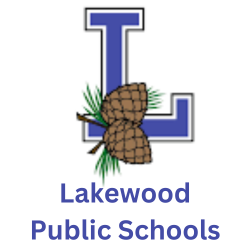
Share this job

IMAGES
VIDEO
COMMENTS
must report it to the principal no later than the end of the school day. In cases where an immediate action is required, an oral report to the principal may be made. A written report must be made when it is safe to do so. All employee reports, including those made to the principal orally, must be confirmed in writing, using the Safe Schools ...
Strong leadership is a key factor. A 2021 research report commissioned by the Wallace Foundation that looked at data from more than 22,000 school principals in four states concluded that replacing a below-average principal with an above-average principal results, on average, in an extra 2.9 months of math learning and 2.7 months of reading ...
Given the chance to rewrite what you already know of what a teacher report is, you would of course take the opportunity and revise what you used to know and apply what you already know. Come take a look at these five simple ways to write a teacher report. 1. Use Simple but Clear Jargon.
Download Article. 1. Review your draft and make changes to it. Correct the letter for a final version and make two copies, one to hand in and one for yourself. If you submit a handwritten letter, make certain it is legible. This may mean re-writing the letter once you have made all the corrections you want to make.
STEP 2: ADDRESS THE RECEIVER, WRITE DOWN THE NAME OF PRINCIPAL AND THE SCHOOL AS WELL. 7. STEP 3: NEXT LINE, WRITE DOWN THE NAME OF THE SENDER. 8. STEP 4: NEXT TWO LINES, THE SUBJECT AND DATE OF THE REPORT. 9. STEP 5: WRITE YOUR REPORT IN SECTIONS OR PARAGRAPHS. 10. STEP 6: IT IS MOSTLY WRITTEN IN PAST TENSE.
Conclusion: Mastering the Craft of School Report Writing in Secondary Education. The process of school report writing, especially in the context of secondary education, embodies more than just an administrative or assessment task; it's an art form that bridges the gap between a student's efforts and their achievements. Despite being time ...
Tips for Writing School Reports. Writing a school report should not prove to be too much to handle, but one can always use a boost whenever possible. To help with your report writing, here are four tips that you can keep in mind as you go through the endeavor. Tip 1: Be Direct. There's no use sugar-coating whatever it is you are trying to ...
10 School Report Writing Tips. School report writing has two main components: an assessment component and an advice component (e.g. you are currently working towards this goal, to ensure you meet it, do this, this and this). The advice component takes the form of a progress report, but there's no one model or framework that works for everybody.
That's the key finding in this report analyzing research since 2000 about school principals. The report affirms that effective principals have a pronounced, positive effect on the schools they lead. They contribute to important outcomes like student achievement, reduced absenteeism, and teacher retention. The report also describes the ...
Teacher Tips for Writing Student Reports (1) Know your school. Your school, like every school, will have its own system for report card comments. Make sure to consult with your principal or curriculum coordinator to get a clear understanding of their expectations.
Sample Complaint Letter About Sexual Harassment at School. Dear Mrs. Jimenez, As a principal, I realize you have a tough and demanding job. I know that you are passionate about helping the students succeed at Oakridge High School. It is important that you know about a serious matter that is happening within your school.
When drafting a request letter for the issuance of a report card to the school principal, clarity and politeness are essential. Begin with a respectful salutation and clearly state your name and purpose for writing the letter. Specify the semester or class for which you need the report card and provide a brief explanation of why you require it.
Has begun to develop cooperative play skills such as sharing and taking turns. Is a creative and imaginative learner. Engages in strong exploratory and discovery play behaviors without prompting. Is enthusiastic and engaged when given developmentally appropriate resources to play with.
Step 2: Add the Date and Principal's Contact Information. Include the date of writing the letter and the principal's name and school address below your contact information. Step 3: Write a Polite Salutation. Start with a respectful salutation such as "Dear [Principal's Name],". Step 4: Clearly State the Purpose of Your Letter
Writing a Formal Letter to School Principal - Format and Points to Remember. A letter to the principal is always written for particular reasons, and it has to be in the format of a formal letter. You have to make sure that you provide all the necessary information promptly. This includes the receiver's address, date, subject stating the ...
Subject: Complaint Against Teacher [Teacher's Name] Dear [Principal's Name], I hope this letter finds you in good health. I am writing to express my deep concern and disappointment regarding the conduct of one of the teachers at our school, [Teacher's Name], who teaches [Subject]. As a concerned parent/student, I feel compelled to bring this ...
Customer Success Manager. Teacher evaluation comments from principals are crucial in assessing and acknowledging teachers' contributions in shaping the learning environment. Principals provide valuable insights into teachers' strengths and areas for improvement through these comments. When used correctly, these comments from principals can ...
Subject: Whole school. Age range: Age not applicable. Resource type: Other. File previews. docx, 15.78 KB. Template for School Principal's Report to the Board. Tes paid licence How can I reuse this?
Principal's Report | 2 Narrative/Summary Starting with the July 2019 Principal's Report, there will be a Dashboard section following the Narrative/Summary of the Principal's Report. The Dashboard will present a graphic summary of important school data to allow the Board of Trustees
When dealing with something as significant as bullying, it is important that you set a meeting with the principal. Try to avoid email because it can be misinterpreted too easily. Instead, ask for an early morning meeting. Meeting in the morning is usually more productive because the principal may feel more refreshed.
Write your report. You must include the following: • some of the difficulties that you and other students had when you joined the school. • suggestions about what the school can do to help new students. • how the students and the school will benefit. Cover all three points above in detail. You should make your report polite and informative.
Dear [Principal's Name], I am writing to request a change of teacher for my child [Student's Name], who is currently studying in [Grade] in [Teacher's Name]'s class. Unfortunately, my child is not responding well to the teaching methods used by their current teacher, and I believe that a change in teacher would be beneficial for my child's ...
When drafting a report letter to the principal for an industrial visit, maintain clarity and politeness throughout the letter. Begin by addressing the principal and stating the purpose of the letter. Provide details about the industrial visit, including the date, place visited, events attended, and major activities.
A much-loved former principal has tragically lost his life in a freak accident at a school in Melbourne, Australia. Paul Hogan, 61, was collecting balls from the roof of St. Margaret's Primary ...
Report: West Fargo assistant principal violated policy when he touched students, pushed 2 into wall Joshua Dahl has been placed on an improvement plan and will return to work after being on ...
Jason Riley stands outside the entrance to the middle/high school where he will take the role of interim principal for the 2024-25 school year. (CNA photo by NICK PAULY) AFTON - After 20 years of working within East Union, Jason Riley has been named the new interim principal and will help lead the middle and high school for the 2024-25 year ...
Victorian state school teachers and principals have been warned off using artificial intelligence software to write student reports and school newsletters under strict new rules from the state ...
East Wake High School principal writes letter families. ... WRAL News asked the Department of Public Instruction and the State Board of Education if they ever received a report of Rencher's ...
Reports To:Principal, Classroom Teacher, Specialist (Mathematics/Reading) or Department Director/Supervisor. Job Goal: A paraprofessional is a non-certified instructional staff person who does not hold the position of teacher, but assists in the classroom under the direct supervision of the classroom teacher in the school in which he/she is ...
The Transportation Scheduling Assistant will perform a variety of advanced and complex clerical duties in support of routing and scheduling of pupil transportation; input data and operate standard office equipment including computers and related software; maintain transportation activity logs and other data. POSITION SPECIFICS: Working location is based out of the Transportation Department ...